#(because you’re laying foundations for hundreds of writers)
Text
I’ll confess I'm an odd duck who actually prefers what Chibs did with Tegan and Nyssa to any ‘actually they’re wives’ ending, no matter how cute I find that idea.
A) It feels real - the old companions don't have space-time travel access, that’s the point, it’s why they all have so much unresolved trauma because so many parts couldn’t be directly addressed, Tegan wouldn't have seen Nyssa again. That’s a fairytale ‘winning lottery ticket’ ending that no one in the real world gets, and I generally prefer realism in my stories (though no shame to those who don’t).
But also because B) That makes her perfect to help Yaz, I think by very deliberate design. Tegan also lost her alien not-girlfriend. It probably took her a long time — or more likely implied to be never, with multiple failing heterosexual marriages — to process that. And here is Yaz is in such a similar position.
It gives her the chance for Tegan to support Yaz in not making the same mistakes she did, and in the process, maybe resolve her own feelings, which might not be so easy given the time she was raised in. And here is Yaz, who also didn’t know that what she was actually feeling was love, not friendship, for the longest time. Perhaps may not have even really examined her sexuality particularly prior to that, and while that’s far easier for a woman who grew up in a time where being gay is far less of an issue, she’s a muslim, she’s not ignorant to homophobia, and would certainly understand someone finding that difficult, if like her they’d never noticed, or perhaps not wanted to notice, the difference in those feelings for this person in particular.
They are both incredibly complementary to helping each other heal.
Which is what this has always all been about - healing. And it never being too late to.
I know it’s not as nice a story, but I think it’s a better story.
#power of the doctor#tegan/nyssa#nyssa/tegan#chibs writes worlds more than stories#which especially if we’d just hit hiatus#would be ideal#but it means this is where things come together#in the sitting down and thinking where the lines will intersect#if you follow them down their paths long enough#(i mean i would also prefer eh a little more story vs world)#(on balance)#(but if it’s going to be lopsided)#(for doctor who i’d err towards world too)#(because you’re laying foundations for hundreds of writers)#(rather than simply creating a thing by yourself)
51 notes
·
View notes
Text
And you know what guys. You know what. Feel free to use these prompts for original fiction.
Because if we’re being honest with ourselves, this IS original fiction.
Miraculous Ladybug doesn’t have enough substance to fill a drabble, let alone a several-thousand word story.
Anything you write for Miraculous Ladybug is putting in twice the amount of effort the writers have invested for the entire show.
If you write a few hundred words of Miraculous Ladybug fanfiction? You have invested more time and care into this universe than the writers who actually get paid for this have.
Anything you write for Miraculous Ladybug is at this point, original fiction.
I’ve compared writing fanfiction to decorating a house before, so lets use that metaphor again.
Writing fanfiction is like rearranging the furniture in a room.
Writing an au is like replacing some of the furniture.
Writing a rewrite is like throwing out all the furniture and bringing in new ones.
But the house is still there. The foundation is already laid, the walls are already up. You can take a sledgehammer to them if you really want to, but that’s moving beyond redecorating into something entirely new.
Miraculous Ladybug has no foundation. It has no walls. It has, at best, scaffolding.
There is no meaningful plot. There is no character development. There is no depth to the characters. Nothing means anything. Nothing matters.
You are not redecorating a house when you write Miraculous Ladybug fanfiction. YOU are setting the foundation, YOU are building the walls, YOU are not just bringing in furniture, you’re crafting it all by hand.
If writing fanfiction requires that you invest more energy into the fic than the original source has ever put out, it’s no longer fanfiction.
If you have to come up with personalities for every other character, if you have to give them meaninful backstories and build their relationships from scratch, if you have to lay the foundations for the rules of the very universe?
That’s not fanfiction anymore. That’s original fiction with pre-existing character’s named ducttaped over the original characters.
If you write a Miraculous Ladybug AU, if you rewrite Miraculous Ladybug, if you rewrite a single scene so that it has lasting impact that matters and makes sense and doesn’t go against everything the characters have before now stood for, if you redesign the characters from the ground up and give them actual meaning and creativity and care...
that’s not fanfiction anymore.
That’s original fiction.
Any effort you put into making Miraculous Ladybug compelling and fun is more effort than the creators have ever and will ever invest into even a single episode.
You are writing original fiction. You might as well embrace it. You deserve it. If you’re putting in this much effort, you deserve the opportunity to be paid for your efforts. Because at this point, you’re not writing fanfiction anymore.
Write ML fic if you want, if it’s fun enough for you. But just keep in mind that everything you are writing is more effort than the creators will ever invest in the show. All you have to do is change the names of the characters, and they will be unrecognizable from the caricatures that exist in the show.
You might as well take credit for what you’re creating, because it is all coming from you.
#miraculous ladybug#ML writing prompts#for the prompt blogs#ML writers salt#like seriously#literally
75 notes
·
View notes
Note
Do you think that if Shredder!Raph will occur in rottmnt, the aftermath might result in Raph inheriting some of Shredder’s rage even after saved? Maybe that is how the crew is going to implement Raph’s trademark temper throughout previous generations and maybe even make him have to step down due to it, making Leo the new leader?
Short answer: “Inheriting the rage of a centuries-old demon" is a dope-ass idea, so if you’re a writer I would definitely encourage you to use that in your own stuff. But I think that if Raph’s temper worsens throughout the show, it should be because of his own character development and not a magical effect. However, a Shredder!Raph scenario could contribute to said worsening temper by inflicting emotional/psychological damage instead. :)
Long answer ahoy!
Looking at “Many Unhappy Returns” from the Shredder’s perspective makes it very clear why he does what he does. Like, he’s been dead for five hundred years, and then something went wrong with his resurrection. He’s waking up with no idea where he is or what’s going on and oh shit those guys are pointing weapons at him, that’s a threat!
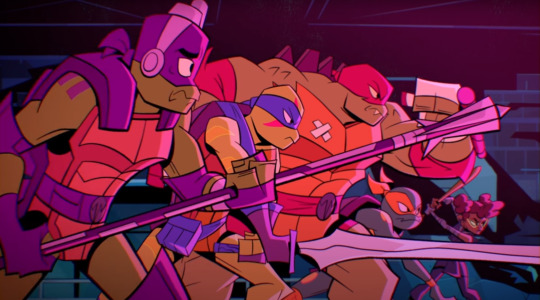
Note that he doesn’t even bolt for them immediately, he does a warning stomp and screech (back off!) before starting to approach.
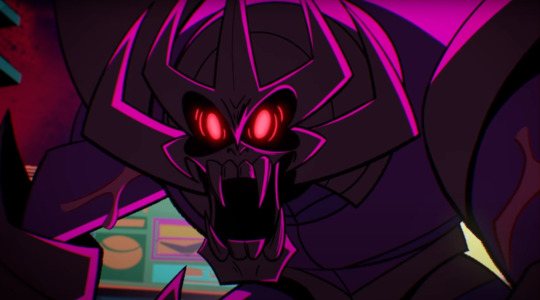
Those other guys are yelling, that’s also a threat,
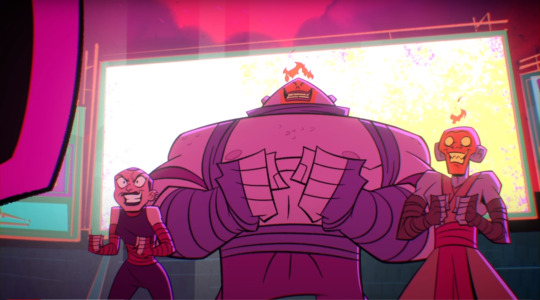
and they’re closer so he’s gonna attack them first, actually. (None of the Foot wind up even comically injured, suggesting that flailing them around was an intimidation tactic rather than genuine Murderous Intent.)
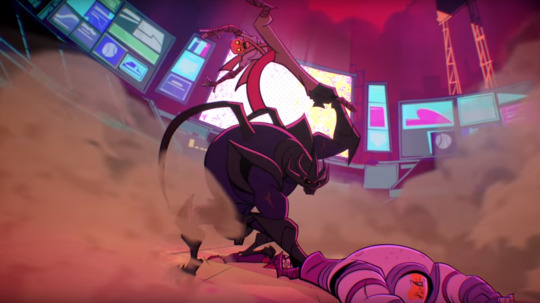
And then the first group attacks, so of course he’s going to retaliate.
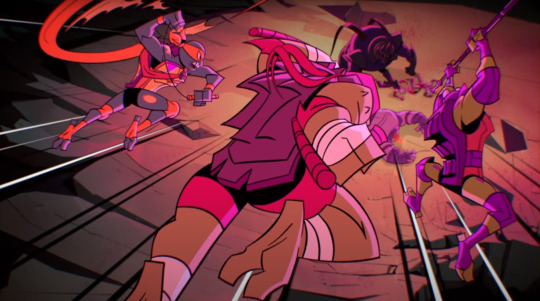
And then suddenly he’s somewhere else, with other threats (the animatronics), and then the first group that attacked him is back, so he’s gonna fight them again.
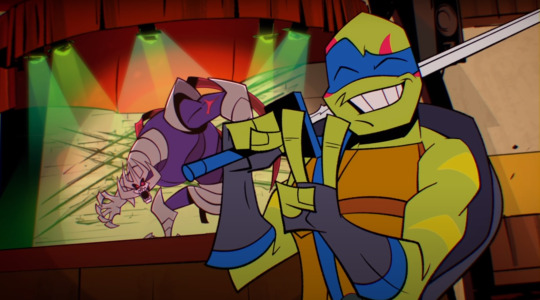
And these jerks just keep following him? He’s not going to ignore that. And WOW that’s a lot of bright lights and loud noises, which are also threats, what the fuck is going on?!
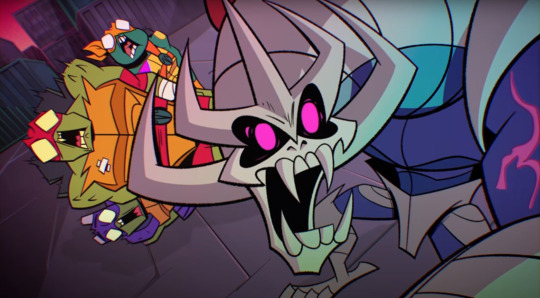
And then this tiny human girl chucks a giant metal box at him, holy SHIT?! Sure, the Shredder is a dangerous antagonist, but at this point I wouldn’t call him a “bad guy”, he’s literally just responding to what’s happening to him.
In summary, the Shredder was stressed tf out because he didn’t know where he was or what was happening, he retaliated against perceived threats, and quite possibly wouldn’t have attacked the turtles in the first place if they hadn’t just rushed in without understanding the situation.
Gosh, doesn’t that sound familiar?
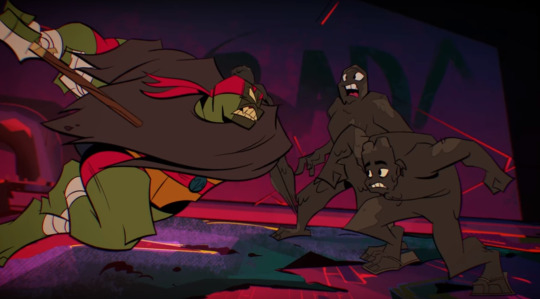
So yeah, I’m waiting for Rise to give us that good good Shredder!Raph content.
As for the possibility of Leo taking over afterwards... no, but also yes, sort of? On the one hand, we know that Leo does have leadership capabilities, and it would be a waste for the narrative to not explore that. On the other hand, Rise has broken from the status quo in many ways, and it would also be a waste for the show to do a complete 180 and return to Leo Being The Leader™.
Consider how the “leader” role has influenced Leo in past iterations: his perfectionism wears on him and his brothers, any failure tanks his self-esteem, he feels isolated from the rest due to taking on such a large share of responsibility, being an authority figure grinds everyone’s gears, etc. It’s just bad for his mental health.
No doubt all this responsibility will also wear on Rise!Raph as the story progresses and the stakes get higher. It will be bad for him as well. But if Raph steps down, Leo will once again suffer from the weight of this role. So if neither option is quite correct, if neither brother can shoulder the burden of leadership alone, then the solution is just... for neither of them to shoulder the burden of leadership alone. Sure, Raph will probably remain leader in title and in spirit, but Leo taking on a sort of “deputy” role makes sense from a strategic standpoint, and would be good for his character development.
Here’s how I think it could go down:
The Shredder!Raph scenario will be different from the Shredder!Draxum scenario. The Shredder was starved for mystic energy the first time around, so he immediately chewed Draxum up and spit him out. But Raph could be compared more to a battery than a meal; it will take a while for the Shredder to drain him. And at this point the Shredder could be back in “evil samurai” mode, and thus will understand the value of holding Raph hostage.
Y’all who have followed my blog for a bit know about my “Raph is a system” theory; that when he was little, he got separated from his family and pursued by some cryptid hunter. This trauma formed Savage Raph, who is able to handle “being lost/alone/threatened” when Host Raph cannot. “Pizza Puffs” didn’t give us a lot of info about who I’m calling “Red Raph”, but he made his presence known when Host Raph was sort of... "emotionally alone”? In that his brothers were dying a little bit and too stoned to care.
So if Raph is trapped inside a living cage, scared and helpless and hurt and exhausted, his family unable to help him... he’s not going to be able to handle it.
Or, rather, Host Raph isn’t going to be able to handle it.

These two can, though.
I’m imagining a scene in the mindscape where the Shredder says something like “Your pathetic family cannot bear to strike you down, and so there is nothing that can stand in m- wait, why are there three of you OW FUCK-” Red and Savage will mentally kick his ass long enough for the other turtles to rip off a chunk of the armor so Leo can portal it into another dimension or something. Shredder gets K.O.’d since he’s not whole anymore, and the battle is won.
Since the armor didn’t drain Raph as severely as it did Draxum, he won’t become as weak as Draxum did. However, it will still take him some time to recover. Raph trusts Leo in serious moments as of “Many Unhappy Returns”, and he already took charge when Raph wasn’t available back in “Man vs. Sewer”. So Raph will be like, “Hey Leo, can you handle the Mad Dogs for a bit? Just long enough for me to get back on my feet.” And Leo will be like, “Sure bro, I’ve got this.”
He does not, in fact, “got this”. Leo’s ego has caused trouble before (”Shell in a Cell”, “Minotaur Maze”), and being in charge will no doubt go to his head. This has the potential for both comedy and seriousness, leading to wacky mishaps and genuine danger. Being the leader is hard work and it’s not always fun, but someone has to do it and Leo will have to put the others before himself for it to get done. Once Leo realizes this, he could bond with Raph by asking for his advice on leadership. Sometimes Leo will follow the advice and sometimes he won’t, sometimes that will work out and sometimes it won’t, laying the foundation for the idea that there are situations where it will be better for one or the other to lead, rather than having one lead all the time. But that will only happen for a few episodes, because Raph will heal quickly and he’ll be the leader again and everything will be fine!
Everything will not, in fact, be fine. Raph is the strongest in the family, the tank, the one who can take a hit so the smaller ones don’t have to... the idea of being hurt, of being weak, scares him because his family is also in danger if he’s unwell. So I don’t think he’ll acknowledge to anyone, not even himself, that getting possessed hurt him emotionally as well as physically. And when a wound isn’t acknowledged, it doesn’t get tended to, and when a wound isn’t tended to, it gets worse.
That he’s a system will add another layer of complexity to this. The Shredder!Raph incident would make all the alters aware of each other via mindscape shenanigans, but it would also leave them with the fear of not being in control, so I think they’ll come in conflict with each other for a bit. They’ll argue with themselves, switch, and lose time more often, enough that it impedes their ability to function and the other characters start to notice something is wrong.
Host Raph will convince himself that Everything Is Fine and try to get things “back to normal”, which probably means he’s just straight-up not going to acknowledge that he's a system. He’ll rationalize that he’s always “gotten weird” from time to time, so it’s nothing to think too hard about... right?
Savage Raph will be on high alert because they just survived a near-death (a near soul-destroying) experience. He’ll probably take the front and go overboard fighting some villains that Host Raph could have ordinarily fought on his own. It might also take a while to convince Savage Raph that these “sewer monsters” who keep following him around really don’t mean him any harm.
Red Raph will get snappy (pardon the pun) about the more social aspect of “not being in control”; that Host Raph asked Leo to be in charge and then Leo started being an egotistical dumbass. And when Leo does make the right decisions, Donnie and Mikey might side with him over Raph, and that will also grind his gears.
Mix all that together and you have a recipe for a capital b Breakdown.
So yeah, I can definitely see how the Shredder!Raph incident and its aftermath would worsen all three of their tempers, trauma will fuck up your emotions real bad. Perhaps Host Raph loses faith in himself and tries to step down and get Leo to replace him as leader... only for Leo to be like “Bro I cannot do this full time I will one hundred percent have my own Breakdown if that happens.”
The life lessons here are that Leo learns to offer support by sometimes taking the leader role; not to benefit his own ego, but because he wants to help Raph. And Raph learns to accept support by letting Leo be in charge sometimes; not because he’s weak or incapable, but because he can’t always be a Staunch Immovable Rock and he needs to let himself rest by trusting Leo.
And then the Raphs can work on communicating, cooperating, letting their allies know about them, digging into their trauma, etc. now that they have some breathing room.
(Do you think the Hidden City has therapists? Steven Universe and Mao Mao both have therapists can we BLEASE get one for Raph.)
#Anonymous#rottmnt#rottmnt theory#rottmnt raph#rottmnt leo#rottmnt shredder#shredder!raph#savage raph#red raph#there's like 1800 words here holy shit#if anyone wants to do fic for this u have my blessing to go hog wild#the 'raph is a system' theory
223 notes
·
View notes
Text
How to Create Your Own Herbal Tea Garden
For these uncertain times, a step-by-step guide to growing brew-friendly plants at home, and using them to make infusions that soothe and restore.
Here, tea ingredients of rose, chamomile and lemon verbena are shown in their natural, harvested and dried states.Credit…Fujio Emura
Oct. 22, 2020
You're reading: How to Create Your Own Herbal Tea Garden
The tea garden — a typically modest plot dedicated to the growing of herbs and flowers for steeping — has its roots in ancient herbalist traditions and helped lay the foundation for modern botany. According to “The Gardener’s Companion to Medicinal Plants,” a 2016 guide to home remedies, the study of herbal medicine can be traced back 5,000 years, to the Sumerians of southern Mesopotamia, who listed the names of hundreds of plants — including fennel, mint, thyme, sage, myrtle and marjoram — on clay tablets that were later rediscovered in what is now Iraq. Modern scholars believe that the Sumerians used what they grew in medicinal preparations such as tea infusions that were intended to treat ailments from toothache to inflammation. And in England, says Timothy d’Offay, a tea importer and the founder of Postcard Teas in London, tea gardens have their origins in the work of 17th-century apothecaries such as Nicholas Culpeper, a botanist and physician whose encyclopedia of herbs, “The English Physician,” has remained in print since it was first published in 1653. “The apothecaries’ focus was on the use of herbs in healing,” explains d’Offay. “It was really the beginnings of modern medicine. We often think that drinking anything without caffeine is innocuous, but herbal tea has power.”
Image
In Deborah Needleman’s tea garden in New York’s Hudson Valley, rows of lemon verbena, lavender, calendula, basil, thyme and bush bean fill a rectangular bed flanked by boxwoods.Credit…Fujio Emura
Now, in this time of uncertainty, as we cleave to small, controllable comforts, the idea of the medicinal tea garden is taking root once again. Easy to cultivate on a windowsill or balcony, or in any garden bed, and yielding ingredients more potent than typical store-bought equivalents (specimens cultivated in artificial terrains tend to produce less flavor), these plots of herbs and edible flowers offer a chance to reconnect with nature, and a soothing balm for our collective anxieties. “Herbalists have long talked about the value of growing your own plants,” says Karen Rose of Sacred Vibes Apothecary in Brooklyn, “and with a tea garden you can propagate plants that will actively improve your health.” Since the pandemic hit the U.S. in March, she has seen a dramatic rise in homegrown plants, such as lemon balm, mint and chamomile, which are thought to relieve stress and help regulate disrupted sleep patterns.
Image
Needleman’s tea garden is attached to the 18th-century barn she uses as a drying and processing room. In the foreground, lemon verbena and calendula grow in a bed of dahlias.Credit…Fujio Emura
Image
Bronze fennel, whose burnished yellow florets are often used fresh in tea infusions, proliferates in Needleman’s garden.Credit…Fujio Emura
For the writer and editor Deborah Needleman, formerly of T, the joy of the tea garden is at once horticultural and aromatic. “Growing and blending teas extends the gardening season in that it allows me to be with my plants all through the year,” says Needleman, who nurtures herbs in her garden in New York’s Hudson Valley. “And the smells are so wonderful. Opening a jar of dried lavender during winter is heavenly.” Last year, she developed her first small-batch dried blend, Summer Tea, and this fall, her loose Garden Tea mix of mint, lemon verbena, rose and other fragrant herbs will be available at the florist and soap-maker Sarah Ryhanen’s World’s End farm and online store, Saipua. Here, Needleman shares her tips for establishing and harvesting your own tea garden — and she, Rose and a few other growers and herbalists share their ideas for putting your bounty to use.
Image
In a scrubland field beneath a walnut tree, Needleman has planted mint and lemon verbena. “They’ll just keep going until they form a carpet,” she says, “so if you have a space that needs ground cover, they’re a great, low-maintenance option.”Credit…Fujio Emura
How to Plant
While it is possible to grow your own black tea (camellia sinensis) in northern climates, without the warmth and abundant sunlight the plant needs to thrive, the effort is unlikely to be worth the negligible yield. A herbal tea garden, by comparison, is far more resilient and manageable, especially if you’re in a city apartment. “Use whatever space you have,” says Rose, who suggests starting with individual pots of lemon balm, lavender and chamomile — ingredients you can blend for a relaxing bedtime infusion. “Just a few sprigs can create an effective blend that you can use all winter.”
Where you position your plants is crucial, though. “Many herbs are Mediterranean, and so they need at least six hours of sunlight a day and they want to be dry,” says Needleman. If you’re planting in pots, make sure they have drainage holes or stones at the base and, if they’re outdoors, she advises moving them to a sunny windowsill inside during the colder months. For those planting directly into the ground, she suggests using a corner of a vegetable plot. And approach the planting, or placing of pots, much like you would a floral display, juxtaposing the various colors, shapes and textures of different species. Low-lying plants such as lemon thyme look nice along a border, while the chartreuse tones of lemon verbena create a vivid contrast against dark leaves.
Image
Bunches of bronze fennel, lemon balm, sage and Thai basil bound with twine for drying.Credit…Fujio Emura
Image
Read more: Shed Organization: 8 Easy and Inexpensive DIY Garden Tool Storage Ideas – Gardening @ From House To Home
A damask rose sits alongside dried rose petals. “All rose petals are edible,” Needleman says. “But for tea blends it’s nice to use a fragrant variety like a damask.”Credit…Fujio Emura
How to Harvest
“The more you cut, the more they grow,” says Needleman, who recommends investing in a pair of sharp scissors for trimming (she likes Joyce Chen’s Original Unlimited Scissors). Aim to harvest leafy varieties (mint, lemon verbena, lemon balm, thyme) before they flower: “once a plant blooms, the leaves lose freshness and become bitter.” By contrast, gather the floral herbs you’d like to dry (rose, lavender or chamomile) as soon as they start to bloom and before the blossom starts to decline. The time of day can play a part, too: “It’s good to harvest in the mornings, after the dew has dried, but before the plants get stressed by the sun — that’s when they’re at their most fragrant,” Needleman says. The rule of thumb is to collect around 5 percent of a plant’s total volume each time you trim and, she advises, “you want to make a clean cut for the health of the plant, cutting down to the next set of leaves and removing any damaged ones.” Wash your harvest under the tap carefully and then gently dry the herbs and flowers with paper towels, otherwise you risk bruising them and leaching out their essential oils.
Image
Inside Needleman’s barn, sage hangs to dry on a ladder beside bunches of the willow sticks she uses for basket weaving.Credit…Fujio Emura
How to Dry
In the spring and summer you can snip plants from your garden and put them straight into your teapot, but as the colder nights draw in, it’s worth shoring up supplies by drying what you collect. To dry, store your crop in a cool place with good air circulation and away from sunlight. Needleman likes to gather her herbs into small bunches and hang them upside down. To preserve flower heads such as chamomile, she spreads them out in wicker trays or baskets. “You have to rustle them up a bit to get the air into them,” she says of the dehydration process, which can take up to a few weeks. “When it’s really crumbly, it’s ready.” Once your ingredients are completely dry, the meditative process of destemming can begin: Strip the leaves or flowers from their stalks before storing them in airtight glass jars. It’s a task that Needleman likes to carry out at the kitchen table after supper. “It’s just so mindless and relaxing,” she says.
Image
Needleman’s infusion of fresh chamomile, lemon verbena, mint, lemon thyme and damask rose.Credit…Fujio Emura
What to Make
Now that you know how to plant, harvest and dry your herbs, here are a few recipes — and a couple of less expected uses — to try. Unless otherwise specified, each of the drinkable blends makes one pot and can be made with either dry or fresh ingredients (loose or enclosed in a bag) in ratios according to taste. Use hot rather than boiling water to best preserve the potency of the plants and keep your pot covered during steeping.
Deborah Needleman’s Uplifting Aromatic Blend
“The chamomile in this tea is crisp and bright like a fresh apple,” says Needleman of her custom infusion, “while the mint and lemon balm are earthy and grounding, and the lemon verbena brightens everything up. It’s a balance between sharp and earthier tastes and scents.”
Ingredients (in equal parts):
Chamomile
Rose
Lemon verbena
Mint
Lemon thyme
Preparation:
Steep for 4-6 minutes.
Image
The herbalist Karen Rose prescribes a healing blend of, from top, echinacea blossom, lemon verbena and calendula blossom.Credit…Fujio Emura
Karen Rose’s Immune-Boosting Garden Blend
“I love this blend because it’s so accessible,” says Rose. “Echinacea blossoms are believed to have antimicrobial and immune-stimulating properties, lemon verbena is an antibacterial known for its nervous system and gut support and calendula blossoms can also help enhance the immune system. The fact that we can all grow these plants means that wherever we are we can have access to a form of medicine that has the potential to help keep us well through the cold and flu season.”
Ingredients (per cup):
A couple of echinacea blossoms
A few calendula blossoms
1 teaspoon lemon verbena
Preparation:
Read more: Harvesting Watermelons – When is Watermelon Ready to Pick? (Updated)
Steep for 20 minutes.
Image
Heidi Johannsen Stewart’s Le Hammeau blend combines, clockwise from top left, lavender, rose, chamomile and lemongrass.Credit…Fujio Emura
Heidi Johannsen Stewart’s Le Hammeau Blend
“Herbal tea is such a cathartic companion,” says Bellocq tea atelier’s Heidi Johannsen Stewart, whose own Park Slope, Brooklyn, tea garden features lemon balm, rosemary, mint and sage. “This hydrating blend — one of the first I ever infused from my garden — provides an overwhelming sense of well-being. Although the flavor profile is complex, the effect is both calming and uplifting, and it particularly supports the digestive and nervous systems.”
Ingredients:
1 tablespoon lavender
1 tablespoon rose petals
1 tablespoon chamomile
1 tablespoon lemongrass
Preparation:
Steep for 6-10 minutes.
Image
Deborah Hanekamp recommends a blend for the bath featuring, from top, lavender, calendula blossom, pink tea rose and sea salt.Credit…Fujio Emura
Deborah Hanekamp’s Bath-Time Soak
For Deborah Hanekamp, the founder of the wellness company Mama Medicine and author of the book “Ritual Baths” (2020), the windowsill tea garden in her Brooklyn apartment provides plants for both brewing and bathing. To create her soothing tea-inspired bath soak, steep a quarter of a cup each of dried lavender and calendula, along with a small handful of dried rose buds, in a teapot for a minimum of 20 minutes — or, for a more potent blend, up to 8 hours — before pouring the brew into a warm bath together with a handful of sea salt, a spoonful of honey and a few drops of organic cold-pressed olive or almond oil. Light some candles and enjoy. “It can be beautiful to have a few flowers in the water, too,” she suggests. “Let some roses float on the surface; it’s soothing for the skin and a healing visual meditation.”
Image
An arrangement by the floral artist Joshua Werber featuring rugosa roses, mint and hyssop — plants often used in herbal teas.Credit…Fujio Emura
Joshua Werber’s Edible Flower and Herbal Tea Ensemble
Herbs and edible flowers can be as pleasing to the eye as they are therapeutic for the body, and overgrowth and surplus cuttings can provide material for dramatic table decorations. “Homegrown herbs have these really beautiful, wispy shapes,” says the Brooklyn-based floral artist Joshua Werber, who fashioned the sculptural arrangement above out of rugosa roses, orange and hyssop, as well as mint harvested from his own city garden — all ingredients selected in homage to his grandmother’s blend of choice: Celestial Seasonings’s Raspberry Zinger Herbal Tea.
To recreate his arrangement, take a favorite teapot (Werber used one by the English studio potter Seth Cardew) and start with a base of rose-hip branches, which will give the piece its structure. Next, introduce a few of the rugosa rose flowers, making sure you remove any foliage that obscures the blooms and position them in a way that allows the deep fuchsia petals to play off the bright orange of the rose hips. Then, tuck in a few sprigs of mint to create flow and movement, and accent with a couple of flowering hyssop tips. For a final touch of whimsy, take a citrus zester and peel off strips of orange rind before wrapping them around a chopstick and placing them in the freezer; after 20 minutes, uncoil and drape them throughout the arrangement. “I wanted to show the cycles and the processes behind the plant materials used in herbal teas,” says Werber of the piece. “Even though they can be shared, making these infusions is often a personal ritual. There’s an intimacy to them.”
Source: https://livingcorner.com.au
Category: Garden
source https://livingcorner.com.au/how-to-create-your-own-herbal-tea-garden/
2 notes
·
View notes
Text
Is Bellarke misinterpreted or not?

I know this post is long overdue, so sorry for that. I’ve started writing for a publication and it takes a lot of my time. But as promised before, here’s a list of reasons suggesting Bellarke romance and why...
It follows the romantic arc of a lot of romance movies and series. I even created a thread on Twitter comparing some of their lines to the most romantic lines in movies yet the viewers seem to misinterpret. Well, I call bullshit, simply because it is. Now, I can’t give you false hope that they will be paired romantically but I will say this. If they’re not, the writers and producers are less than subpar in their depiction of a platonic couple. Aka they have no idea what they’re doing.
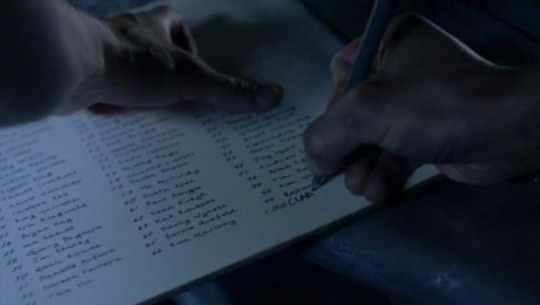
In a show that’s ultimately about survival, it’s difficult to incorporate romance without shifting the emphasis and genre but they seem to do it perfectly with Murphy and Emori, Kane and Abby, Gabriel and Josephine and even Lincoln and Octavia back in the day. What’s sobering about this, is that Bellarke’s scenes are written, filmed and produced more intense, overpowering and chemistry-induced than any of the above-mentioned couples.
This tells me they know exactly what they’re doing and where they’re going with it. Can it be fan service and bait? Sure. But that would make bad television, resulting in audiences looking back on The 100 with dread instead of excitedly recommending it to friends to binge. After Lexa’s death, a lot of fans left the show because of such a sudden horrific end to a fan favorite. I think they might be trying to avoid such a subduing concept again.
Jason explained in his article that viewers slightly misinterpreted Bellamy’s arc and believe it or not, I somewhat agree with him. Bellamy had no other choice than to save all his people by using Josephine’s mind drive as a bargaining chip BUT of course he wanted to save Clarke too. She’s his person, he’d do anything for her. If he was given a choice between saving his people and Clarke, what would he have done? It just so happens that saving her, meant saving everyone.
From season one to six there are highly robust moments which suggest Bellamy and Clarke love each other a lot more than friends should. I’m not including season one scenes in this list because I don’t think they had quite crossed the verge of friendship there, although the “I need you, Bellamy” and “You look like you could use a drink” scenes were emotional and flirty, laying the premise for the most beautiful romance I’ve ever witnessed.
1. Love is weakness
youtube
Listen to the background music of that scene, the intensity and relief on their faces, yeah, that shit’s not platonic. If you wanted to show me they’re besties, they should’ve done a similar hug to Raven or Octavia’s.
When Clarke wakes up in Mount Weather, she asks about both Finn and Bellamy. And the same when she makes it to Camp Jaha. Once Bellamy returns, she runs and throws herself in his arms, which she hasn’t done with any other character except for Madi, her daughter. When Bellamy suggests he infiltrates Mount Weather, Clarke claims she can’t lose him too yet when Lexa tells her love is weakness, she agrees Bellamy should do it by saying she was being weak. Uhm, love is weakness.
2. We can’t lose Clarke
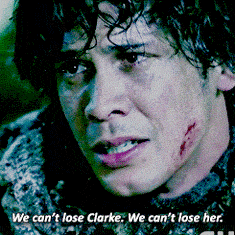
Bellamy crosses an entire grounder army by himself to go after Clarke. Then, limping on a stabbed leg, he’s still hellbent on saving her. All this while his girlfriend is back home, worrying about him. The desperation is in this scene is palpable, bringing us to the realization there’s nothing Bellamy wouldn’t do for Clarke because he clearly loves her.
3. You left me
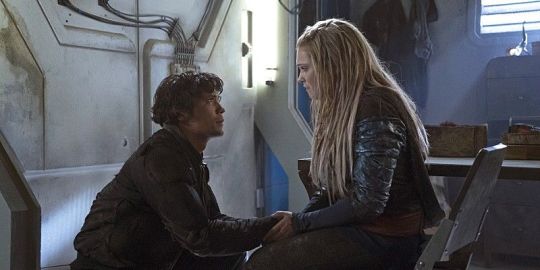
Clarke refuses Bellamy’s offer to go home with him and stays behind in Polis with Lexa. Of course, he’s hurt and furious. When Clake tells him she needs him, he responds with, “You left me.” If you translate that, it would mean, you abandoned me when I needed you most, you chose Lexa over me and now you expect me to help you?
But apart from the dialogue, look at the way the scene is filmed, Bellamy’s in a proposal stance with soft affectionate hand-holding. The way they look at each other, hurt lingering in Bellamy’s eyes. Clarke crushed his heart and yet he still loves her. That scene tramples the edge of romanticism.
4. Start with Bellamy Blake
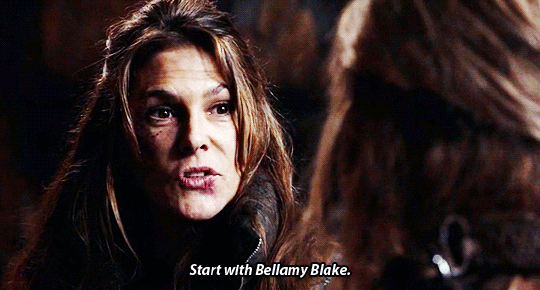
ALIE is an AI, more intelligent than any of our average human minds. She had the knowledge of all Clarke’s friends and family combined. When they had to choose someone to break Clarke’s steadfastness, ALIE suggested Bellamy. Granted, I doubt Clarke was in love with Bellamy at this point since she had just lost Lexa, and still, the AI concludes she cares about him more than anyone else.
All the same, a person can love two people at once. Clarke was willing to co-operate with Roan to save Bellamy’s life. The tears that fell while he yelled at her in Hakeldama, suggests she felt something. While their passionate hug and consoling conversation on the beach could be seen as friendly, they’re not that intimate with anyone else.
5. The list

This was probably one of The 100′s most romantic scenes, until 4x13 and 6x10. “If I’m on that list, you’re on that list.” is a simple way of telling someone you can’t live without them. If I live, you live too. I’m not doing this without you. I need you and ultimately, I love you enough to die with you if necessary.
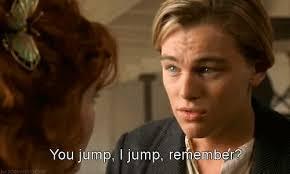
It’s a sobering thought and I think Clarke may have realized the depth of Bellamy’s feelings for her at that moment.
6. If I don’t see you again

Boy, was this scene a bust. Ruined by Roan, who I’ve since dubbed Ruin Roan (I love the Azgeda king). Raise your hand if you know why he didn’t finish the sentence. Here’s a thought, it breeds mystery, but better yet we never got to hear him confess his feelings though we know he would’ve. Giving the writers a scapegoat.
Clarke probably wouldn’t have reciprocated, making the story awkward but Mr. Bellamy Blake was 100% going to tell Clarke Griffin he loved her. Otherwise, he would’ve continued. Now, does he still love her? Absolutely. When you lose someone you love, does your love for said person die with them? Not at all. You find ways to cope and move on but it lurks, showing up when you’re alone or reminded of them. I’m speaking from experience.
7. The oxymoron

When you look at the cold sweat scene, any regular viewer might miss the intimacy but the soft subtle touches do somehow exceed the boundaries of friendship. Bellamy’s face though when he realizes Clarke might be right, he might lose her, shows a lot of fear. Most importantly, this is the first time we’re introduced to the head and heart concept, showcasing their soulmate dynamic. The metaphor compares them to the two lead features of the human body, neither of which can survive without the other.
But, that’s nothing compared to Bellamy’s devastation when he realizes he left the woman he loves behind to die. That hurt in his eyes and voice was heartbreaking.
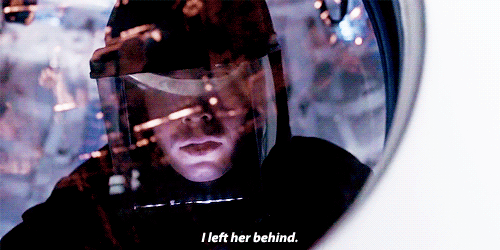
8. The radio calls
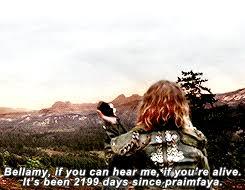
In essence, there’s nothing wrong with calling your best friend every day for six years but when you use him as a way to keep you sane, you might wanna re-evaluate your relationship. Six people left for space, yet Clarke called Bellamy. This is also the first time we clearly see Clarke’s feelings for him. I’m sure they were there for a while, bubbling below the surface but with years of time and peace, one tends to come to terms with who you are.
And in 5x01, when Madi gushes over Octavia, Clarke longingly stares into space, hoping her heart will return. The pining is further emphasized by her expression when she sees Bellamy and Echo kissing. Yeah, camera work doesn’t lie, it was focused on her and Octavia’s faces for a reason.
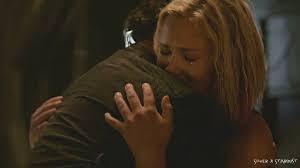
Then, that hug in 5x03 was so profound, a hundred different emotions rolled into one. Clarke asks, “And now you’re home?” What is home, earth or herself?
9. Pleading for the life of a traitor who you love

There are two sides to this story. One, Octavia explicitly compared Bellamy’s feelings for Clarke to those of his girlfriend. That line was written into the script on purpose. If someone knows him, it’s his sister, she’s witnessed their entire relationship first hand and uses it to draw a reaction from him. Why? Because she knows he’s torn up about it.
Secondly, in 5x12, Lexa contrasts herself leaving Clarke outside Mount Weather to Clarke leaving Bellamy in Polis (and the gorge). She calls it her biggest regret and tells her former lover not to make the same mistake she did.
Both times these characters feelings for each other were paralleled to their love for canonical partners. Coincidence? I highly doubt it.
10. The head and the heart
youtube
The emotion in this scene, wow! Throughout season six there are subtle hints of Bellamy’s love for Clarke. He mourns her, Josephine says he cares more about Clarke than anyone else, he tells her the radio calls weren’t crazy but refusing to accept she’s dead and bringing her back to life in Fairytale fashion is nothing short of a beautiful romance.
If the writers had changed their minds about the status of Bellarke’s relationship somewhere along the line, this scene was completely uncalled for. Once again, all I see is I can’t let you go again, I refuse to live without you, I need you in my life because I love you.
11. I tried to do better

Show this to anyone who doesn’t know the show and they’ll tell you this couple’s in love. Clarke goes to Bellamy, no-one else, for comfort when she’s falling apart. Although short, they share another one of their signature hugs where the passion and emotion are louder than nightclub music. With the rising sun as backdrop, this is as far from platonic as you can get.
A few last things
The writers of this show aren’t stupid, they carefully build their plots around the foundation like using the neural mesh in ALIE’s chip to save Clarke. They know exactly what they’ve written, filmed and produced. Bellarke was always meant to end up romantically. Unfortunately, in a fast-paced show with one problem after the other, there’s almost no time to reflect.
If they wanted audiences to become invested in Bellamy and Echo’s relationship, they would’ve shown it to us. In 6x12 the cameras focus on Bellamy and Clarke’s faces when he reunites with his girlfriend. His whole arc (misinterpreted or not) revolved around her. That’s the message they convey and 90% of the audience cannot be wrong. When you watch reaction videos or podcasts, most of them agree.
And, they cautiously circumvent the word love in relation to Bellarke. Best friends love each other, Bellarke love each other. The question is in what capacity. My opinion is this, if I dated Bellamy, I certainly would have at least questioned his devotion to Clarke, yet Echo says nothing. Highly unrealistic.
Lastly, go and rewatch all of the above scenes without shipper goggles. Do you still see the depth and intimacy? I do. I specifically chose these because of the romanticism they entail. All the hugs are great, but best friends hug, these scenes have deeper meanings and though we could’ve misinterpreted Bellamy’s arc in season six, all of their scenes can’t lie. Not bringing them together canonically will do a great injustice to a magnificent show.
Yes, The 100 does not fall into the romance genre but the story revolves around Clarke, Bellamy, and Octavia. For six season they’ve shown us how much the two leads love each other and failing to conclude that book is bad storytelling, to say the least. I believe it should at least be addressed if they decide not to trot down the romantic road.
Happy Hiatus everyone. I might post a few more things while we wait for season 7. I’ve written an article about the anomaly as well. But for now, I’ll focus more on other shows, I’m still writing fanfiction though. Let me know if there’s something specific you’d like me to write about or your opinion on the list.
#the100#the 100 season 6#bellamy blake#clarke griffin#bellamy x clarke#bellarke#bellarke positivity#misinterpreted
348 notes
·
View notes
Text
Fantastic Four Vol 1 #225
Thu Apr 29 2020
[10:09 PM] Wack'd: So the first two and two-thirds pages are something strange. Or I guess they're strange from an in universe perspective.
[10:10 PM] Wack'd: It's basically a condensed version of the back half of the previous issue, rather than a recap. So reading these back to back it feels like everyone's reliving a slightly different, slightly faster version of the same events.
[10:10 PM] Bocaj: Yeah that happens
[10:11 PM] Bocaj: I complain about comics not establishing context with recap pages enough that I can’t really say boo about this kind of thing
[10:11 PM] Aleph Null: it’s just a jump to the left
[10:11 PM] Aleph Null: and then a step to the right
[10:11 PM] Wack'd: I think I might actually prefer it to the writer clumsily trying to give all of this information again in dialogue?
[10:12 PM] Wack'd: It's basically a previously-on.
[10:12 PM] Wack'd: Though the fact that it's not really marked as such is weird
[10:12 PM] Bocaj: Like Aleph’s Japanese animes
[10:12 PM] maxwellelvis: Remember recap pages?
[10:13 PM] Bocaj: I’ve heard of them
[10:14 PM] Wack'd: I think also what's throwing me is that they try to hit some of the same dramatic beats again? Like, you're not really going to convince me "the blind king weeps in crimson" is vital story information
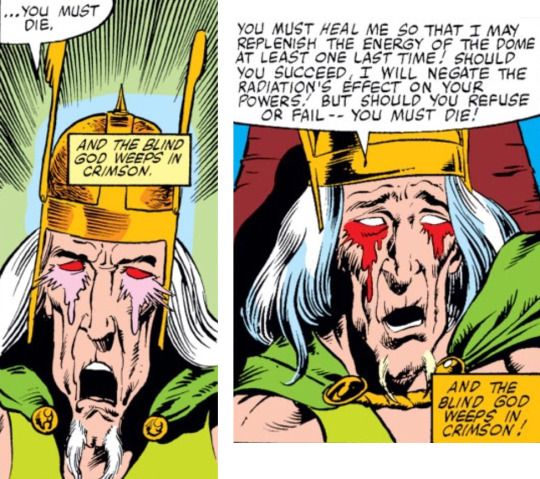
[10:15 PM] maxwellelvis: Because it sounds cool
[10:15 PM] Bocaj: Well that’s nightmare fuel
[10:16 PM] Wack'd: Anyway, I've spent a weirdly long time talking about a recap, but I this is probably the normal amount of time I spend on the first three pages so be glad you're still getting content I guess
[10:17 PM] Bocaj: I do like content
[10:19 PM] Wack'd: Interesting thing about reading these blind and relaying that to you is that it's hard to know in the moment what information will and won't be relevant. For instance, I didn't really make much of this scene last issue:
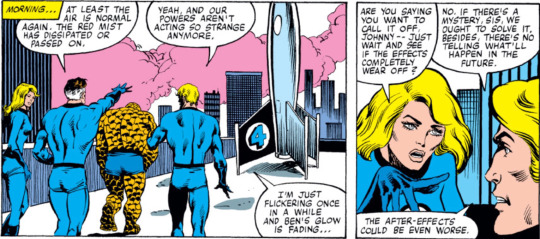
[10:20 PM] Wack'd: But I wish I had, because it makes this moment look friggin bonkers in context:

[10:20 PM] maxwellelvis: "Consistency? What's that?"
[10:21 PM] Wack'd: We've hit a new level of Sue as a blank-slate stock-woman-character: the same writer is making her either a nag or a worrywart one issue apart basically on a whim.
[10:22 PM] Wack'd: Also: "just wants a normal life" Sue is the most boring version of Sue
[10:23 PM] Bocaj: Just a receptacle for women stereotypes?
[10:23 PM] Wack'd: Moreorless, yeah
[10:23 PM] Umbramatic: the Ur-Woman-Stereotype
[10:23 PM] Bocaj: Boo
[10:23 PM] Bocaj: Defined personality women are great
[10:24 PM] Wack'd: Agreed
[10:24 PM] Wack'd: Moving along, we get a very long-winded explanation of the exact science of how this place works which I'm sure makes complete sense
[10:24 PM] Bocaj: Science in comics is always to the highest standards
[10:24 PM] Bocaj: Always
[10:26 PM] Wack'd: Reed is like "I'm not really fine with being threatened and woulda saved your life anyway" and Korgon's like "y'know what, I trust you, we're cool now"
[10:26 PM] Bocaj: See: he shoulda just said please to begin with
[10:26 PM] maxwellelvis: "Oh, I shoulda thought'a that"
[10:27 PM] Wack'd: Ha! He really does just send Vikings to go shopping for him
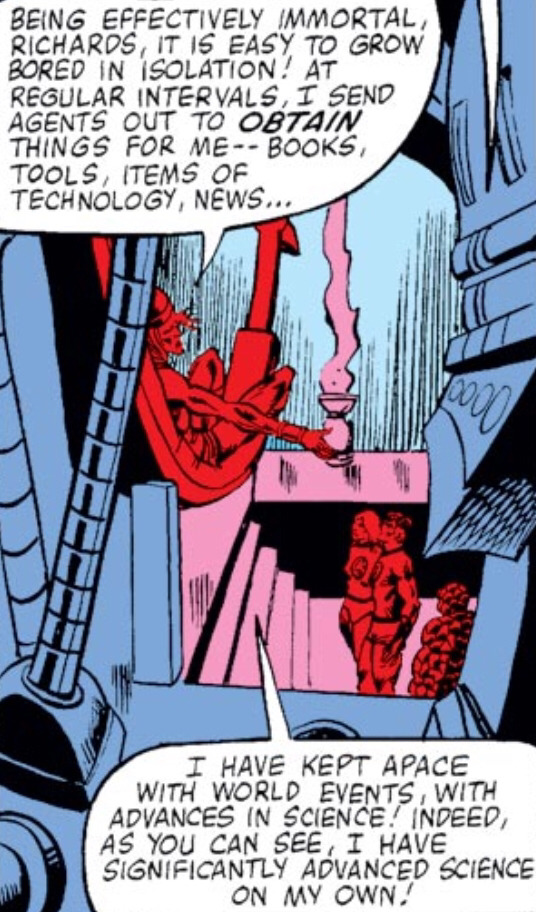
[10:27 PM] Bocaj: God. In a modern comic we’d see some Vikings at the supermarket and it would be great
[10:29 PM] Wack'd: Have I mentioned yet Doug Moench seems to *really like science*
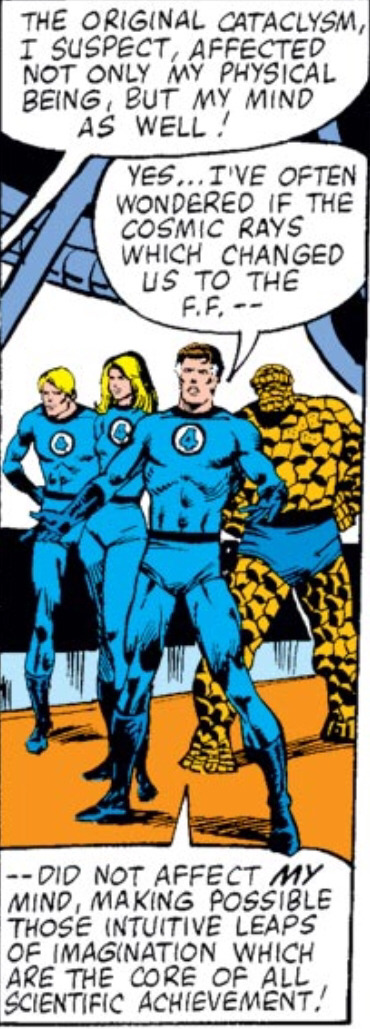
[10:30 PM] Bocaj: SCIENCE! :D
[10:30 PM] maxwellelvis: Nah, like, not superscience. Real science.
[10:30 PM] Umbramatic: i am glad that reaction image is making the rounds
[10:31 PM] Wack'd: So Reed does a lot of research and asks a lot of questions and thinks really hard (all in narrative captions, you're not missing much) and eventually he's finally ready to operate!
[10:31 PM] Bocaj: Woo
[10:32 PM] Wack'd: Buuuuuut the Four's powers go haywire again. Korgon has a machine that cures them of the radiation to stabilize them, but Wiglif--suspicious guy from earlier--thinks they just wanna be at full strength so they can kill Korgon and escape.
[10:33 PM] Bocaj: Dammit Wiglif! That’s such a Wiglif thing to think!
[10:33 PM] Wack'd: To shut him up, Korgon gives Hrolf--trusting guy from earlier--a "Darkfield Rod" that will nullify their powers if they try any funny business.
[10:34 PM] Wack'd: And then Korgon immediately falls unconscious.
[10:34 PM] Umbramatic: that doesn't sound omnious at all
[10:34 PM] maxwellelvis: I give it five minutes before Wiglif tries to steal it.
[10:34 PM] maxwellelvis: NO! Five PANELS
[10:35 PM] Wack'd: To be generous I will not count these three where we cut to Asgard
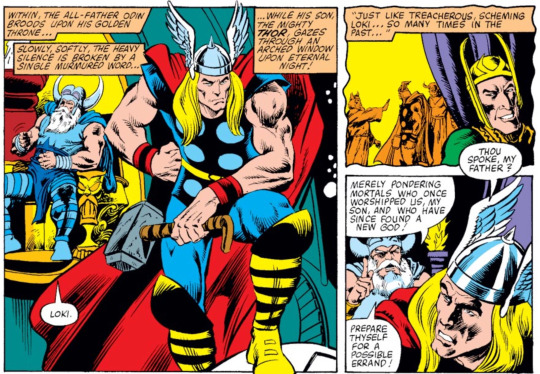
[10:35 PM] Bocaj: Oh hi Thor
[10:36 PM] Bocaj: I didn’t know you’d be in this book
[10:36 PM] Wack'd: "Just considering a crossover, m'boy! I just got the faintest whiff some other book is stealing our shtick!"
[10:36 PM] Bocaj: I’m going to be imagining Odin speaking like the king of Hyrule forever now
[10:37 PM] Bocaj: I want you to know what you’ve done
[10:37 PM] Wack'd: I apologize for nothing
[10:37 PM] Bocaj: =__=
[10:37 PM] maxwellelvis: Sorry not sorry
[10:37 PM] Wack'd: Anyway they do the procedure and we're not sure if it works. And then another cutaway! Sorry max it's been more than five panels
[10:38 PM] Umbramatic: vsfb jnjgfdmkb ;zgl,;.' n
[10:38 PM] Bocaj: To the punishment dome with you
[10:39 PM] maxwellelvis: *the dome.gif*
[10:39 PM] Wack'd: Hey what the heck does that third panel mean? Did...did Alicia just get a vision of the North Pole? Or, like...uh...I actually don't have a second guess

[10:41 PM] Bocaj: When did Alicia brunette
[10:41 PM] maxwellelvis: She overshaded her hair this morning
[10:41 PM] Wack'd: It's been orange for a while now, too
[10:42 PM] Bocaj: She’s supposed to be close enough to Sue that she can be a bad imposter
[10:42 PM] Umbramatic: technicolor anime hair
[10:42 PM] Bocaj: It’s the foundation of a good 60% of the things I mock Johnny for
[10:42 PM] Wack'd: I think we're all okay quietly forgetting that except you for some reason
[10:42 PM] Bocaj: See also 60%
[10:42 PM] Wack'd: Mocking Johnny is admittedly a pretty good reason
[10:43 PM] Wack'd: Ben also had a crush on Sue in the very early days if you want to take that ball and run with it
[10:43 PM] Bocaj: It definitely has layers
[10:43 PM] maxwellelvis: You've both made it weird.
[10:43 PM] Wack'd: Anyway the procedure worked! Probably! Korgon decides he's just gonna assume it worked.
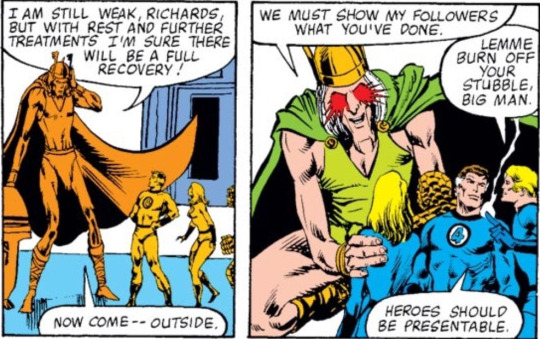
[10:44 PM] maxwellelvis: Was he always that tall?
[10:44 PM] Umbramatic: always a safe bet
[10:44 PM] Wack'd: (Y'ever notice Reed's the only one who ever grows even a little facial hair? Did Johnny just never go through puberty from the neck up?)
[10:45 PM] Wack'd: @maxwellelvis : Yeah, we've just seen him laying down on a nebulously high platform so far. Ben remarks on seeing him for the first time he's like 15 feet
[10:45 PM] maxwellelvis: I think he just shaves regularly to keep up his heartthrob gimmick.
[10:46 PM] Bocaj: Here’s Johnny with a beard
[10:46 PM] maxwellelvis: When he gets on in years, he's probably planning to let it grow out so that the Human Torch can have a *flaming beard*
[10:46 PM] Bocaj: How much do you hate this?
[10:46 PM] maxwellelvis: Like that.
[10:46 PM] Wack'd: Sure, but if Reed has stubble from tirelessly working on this procedure...well, I guess Johnny mighta found time to shave
[10:46 PM] maxwellelvis: He can just burn stubble off and they're in a literal house of mirrors.
[10:46 PM] Wack'd: That's not a bad look on him. He's like the hot version of a grizzled old sailor
[10:47 PM] Umbramatic: dilf
[10:47 PM] maxwellelvis: I want to imagine someone said to him at some point, "Okay, but consider: A beard of FIRE!"
[10:48 PM] Wack'd: I feel like "flaming beard" is a gay joke somehow but like. If Johnny has a partner who's overtly stereotypically homosexual that's the opposite of a beard?
[10:48 PM] Wack'd: Unless he doesn't want people to know he's straight, I guess
[10:48 PM] Bocaj: Beard of FIRE?
[10:48 PM] maxwellelvis: I mean he probably has some sort of LGBT following.
[10:49 PM] maxwellelvis: Chamber? What are you doing in Japan?
[10:49 PM] Wack'd: One of my earliest exposures to this character outside of the Story films was an essay on why he's definitely gay, so
[10:49 PM] Bocaj: Having a flaming beard
[10:51 PM] Wack'd: I tried Google to find the essay but it turned out the one piece of corroborating evidence I remember it is one that literally the entire Internet has picked up on at some point
[10:52 PM] Wack'd: Do yourself a favor, google "johnny storm fire island". Or don't, and let it be a pleasant surprise in like 90 issues.
[10:52 PM] Bocaj: Can doooo
[10:52 PM] Bocaj: The latter
[10:54 PM] Wack'd: "I think I might be Satan, we should talk about that later" is not a good way to make me eager to talk to you later
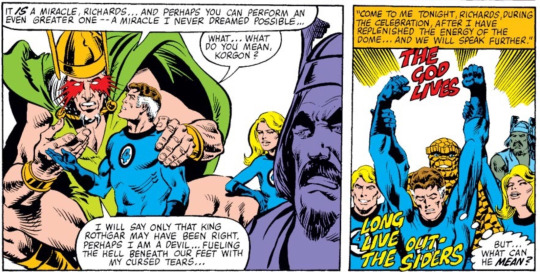
[10:56 PM] Wack'd: While everybody else is celebrating, Korgon loads up enough radiation to keep this place running for another hundred years, and then asks Reed to make him mortal again
[10:56 PM] Wack'd: Wiglif ovehears and is going to do something sneaky
[10:57 PM] Wack'd: The next day Reed tries it, but someone tampered with the machine overnight. Gee I wonder
[10:58 PM] Wack'd: Anyway Korgon is now more powerful than ever and fucking pissed
[10:58 PM] Bocaj: Dammit Wiglif!
[11:00 PM] Wack'd: 'If you press this red button, you get godlike powers and life-giving laser beams, BUT everything looks real spooky forever"
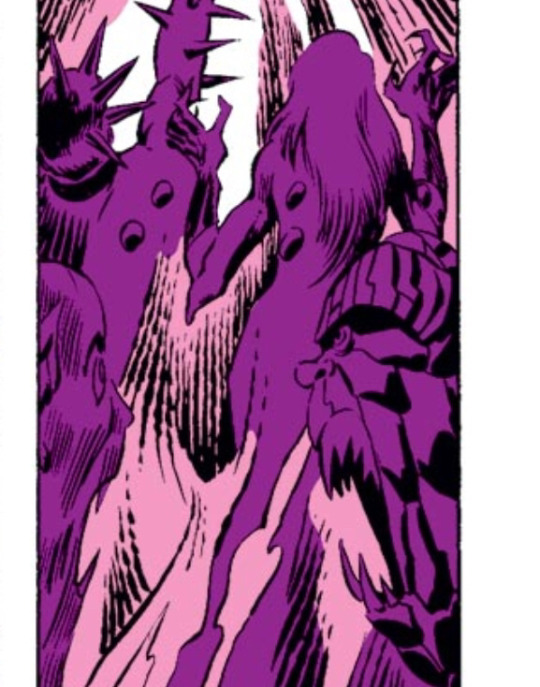
[11:00 PM] maxwellelvis: *Sweating superhero guy*
[11:00 PM] Bocaj: I mean you take the bad you take the good you take what’s left and there you have
[11:01 PM] Bocaj: Spooky shadow monsters
[11:01 PM] Wack'd: The fantasts of life
[11:01 PM] Umbramatic: fucking paralasys demons
[11:02 PM] Wack'd: Haha WHOOPS
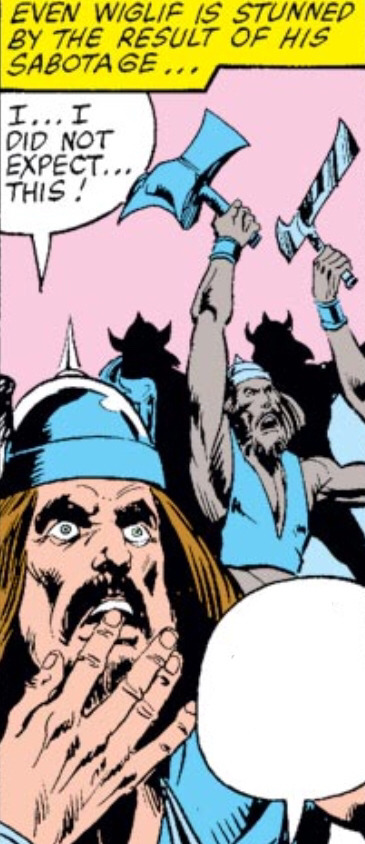
[11:02 PM] Umbramatic: gee willikers, that was a curveball
[11:03 PM] Wack'd: Anyway from here things get predictable
[11:04 PM] Bocaj: Fucking Wiglif
[11:04 PM] Wack'd: There's a fight, it looks like the Four are doomed, Thor shows up, the tide is turned
[11:05 PM] Wack'd: For some reason when I first glanced at this panel I thought that second speech bubble was coming from one of the Vikings
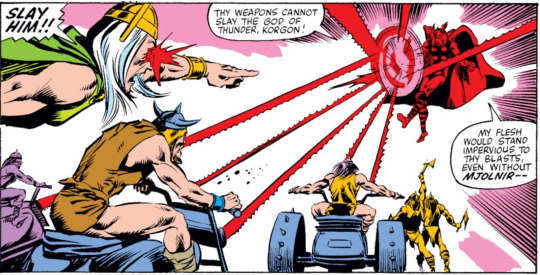
[11:05 PM] Bocaj: Yay Thor
[11:05 PM] Wack'd: "Uh, boss. Hey. You get that's the literal god of thunder, right? And you want us to, what, shoot him with lasers? Maybe think about this?"
[11:06 PM] Bocaj: Lasers are just light and Thor’s Baldrother shines lights out of his armpits
[11:07 PM] Wack'd: Korgon is so pissed by his impending defeat he's just like "fuck this, I'm just gonna destroy everything, including this dome"
[11:08 PM] Bocaj: Hey sometimes you gotta cut your losses
[11:08 PM] Wack'd: Wiglif: 😟
[11:10 PM] Wack'd: The Four and Thor are at a loss so Thor summons Odin
[11:11 PM] Wack'd:
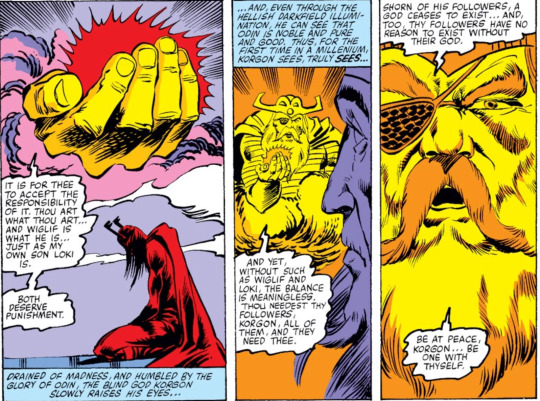

[11:13 PM] Wack'd: This is kind of a solution for a different problem than Korgon has. Like. He doesn't want to be a God? It was kind of thrust on him? I guess it's true that God needs followers and followers need a God, but if he's content to be a follower I don't really see an issue with that
[11:13 PM] maxwellelvis: He also has a responsibility to these people.
[11:13 PM] Wack'd: And it's not like he abandoned his people, he left them 100 years of free energy, during which time they could've solved things on their own in any number of ways
[11:13 PM] Bocaj: Yeah I don’t really understand what Odin is getting at
[11:14 PM] Wack'd: Also, outside the religious philosophy stuff
[11:15 PM] Wack'd: It's a bit naff to just have an all powerful being show up and solve the heroes problems. Especially if it's not with superpowers but rather with delivering the intended message of the story
[11:15 PM] maxwellelvis: Have the Four solved any problems on their own this entire run?
[11:15 PM] Wack'd: Like you could've had Reed talk about the responsibilities of leadership or Ben talk about being a freak or Sue talk about how sacrificing a normal life can be worth it for the people you care about
[11:16 PM] Wack'd: None of those would've been fresh or original but they at least would've been, you know, the main characters solving the problem of their own book
[11:16 PM] maxwellelvis: They needed Gabriel to deal with Scratch, they needed Captain Marvel to deal with the Skrulls, they needed Thor to deal with Korgon
[11:16 PM] Umbramatic: geez
[11:17 PM] maxwellelvis: They've been reduced to guest stars in their own book!
[11:17 PM] Bocaj: Oof
[11:17 PM] Bocaj: FIRST FAMILY
[11:18 PM] Wack'd: Things have been kind of guest cast heavy yeah! Don't know what's up with that and I suspect if you asked Moench or Sienkiewicz they wouldn't remember, besides Gabriel being Moech's baby
[11:18 PM] maxwellelvis: Are there any stories from before the hiatus by them that I missed?
[11:19 PM] Wack'd: It's weird thinking about the fact that I'm currently reading a run of comics that were written by guys with social media presences who seem fairly approachable
[11:19 PM] Wack'd: I don't know if it would work but I could probably just ask them things if I wasn't a dick about it
[11:20 PM] Wack'd: Not sure there's a kind way to be like "why are there so many guest stars in this year's worth of comics you wrote 40 years ago" but
[11:21 PM] maxwellelvis: Something like, "Hey, I'm reading through your brief Fantastic Four run you had with Bill Sienkiewicz and there seem to be quite a few stories in a row where the Four's issue is solved by someone from another book? Do you remember what was up with that?"
[11:21 PM] Wack'd: (Btw Moench and Sienkiewicz were doing a *Moon Knight* run simultaniously with this which is why Sue was reading an issue to Franklin last time. Go figure)
[11:21 PM] maxwellelvis: Heh
[11:22 PM] Umbramatic: oh huh
[11:22 PM] Wack'd: Yeah there's really no way to phrase this that doesn't sound like "why did you write this so bad"
[11:22 PM] Wack'd: Ah well
[11:23 PM] maxwellelvis: The best-case scenario other than getting some hot scoop on the Marvel offices at that time is probably Doug Moench suddenly realizing that himself.
[11:23 PM] Bocaj: Were they long term writers or doing some fill ins and one offs?
[11:23 PM] maxwellelvis: They did like ten issues.
[11:23 PM] Bocaj: I’m in a period of that in avengers. There’s not a lot of guest stars but they’re a lot of inconsequential issues
[11:25 PM] Bocaj: Shame because there are one off villains and characters that would have been interesting to be picked up for more stuff
[11:30 PM] Wack'd: Yeah, ten issues and Moench wrote an annual.
[11:31 PM] Wack'd: But also, their first issue announced that we were sticking with them for a while--I suspect it was intended to be a longer run
[11:31 PM] Wack'd: And then Bryne sniped them somehow
2 notes
·
View notes
Photo
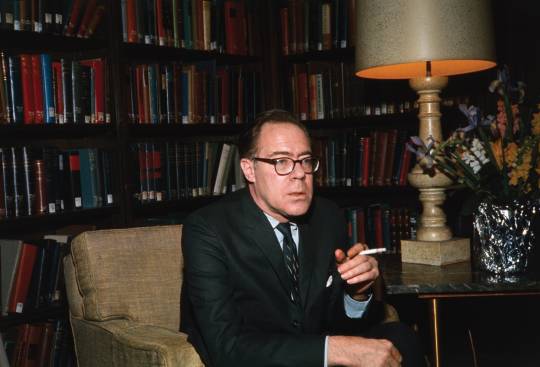
John Berryman in 1966, two years after the publication of “77 Dream Songs.”
The Heartsick Hilarity of John Berryman’s Letters is a book review by Anthony Lane (in The New Yorker) of The Selected Letters of John Berryman. The book is edited by Philip Coleman and Calista McRae and published by the Belknap Press, at Harvard. My acquaintance, the generous Philip Coleman, mailed me a copy of this book at the end of October.
Lane writes, “. . . anyone who delights in listening to Berryman, and who can’t help wondering how the singer becomes the songs, will find much to treasure here, in these garrulous and pedantic pages. There is hardly a paragraph in which Berryman—poet, pedagogue, boozehound, and symphonic self-destroyer—may not be heard straining toward the condition of music. ‘I have to make my pleasure out of sound,’ he says. The book is full of noises, heartsick with hilarity, and they await their transmutation into verse.”
Here is the book review:
The poet John Berryman was born in 1914, in McAlester, Oklahoma. He was educated at Columbia and then in England, where he studied at Cambridge, met W. H. Auden and Dylan Thomas, and lit a cigarette for W. B. Yeats. All three men left traces in Berryman’s early work. In 1938, he returned to New York and embarked upon a spate of teaching posts in colleges across the land, beginning at Wayne State University and progressing to stints at Harvard, Princeton, Cincinnati, Berkeley, Brown, and other arenas in which he could feel unsettled. The history of his health, physical and mental, was no less fitful and spasmodic, and alcohol, which has a soft spot for poets, found him an easy mark. In a similar vein, his romantic life was lunging, irrepressible, and desperate, so much so that it squandered any lasting claim to romance. Thrice married, he fathered a son and two daughters. He died in 1972, by jumping from the Washington Avenue Bridge in Minneapolis. To the appalled gratification of posterity, his fall was witnessed by somebody named Art Hitman.
Berryman would have laughed at that. In an existence that was littered with loss, the one thing that never failed him, apart from his unwaning and wax-free ear for English verse, was his sense of humor. The first that I heard of Berryman was this:
Life, friends, is boring. We must not say so.
After all, the sky flashes, the great sea yearns,
we ourselves flash and yearn,
and moreover my mother told me as a boy
(repeatingly) ‘Ever to confess you’re bored
means you have no
Inner Resources.’ I conclude now I have no
inner resources, because I am heavy bored.
Peoples bore me,
literature bores me, especially great literature,
Henry bores me, with his plights & gripes
as bad as achilles,
who loves people and valiant art, which bores me.
And the tranquil hills, & gin, look like a drag
and somehow a dog
has taken itself & its tail considerably away
into mountains or sea or sky, leaving
behind: me, wag.
“Wag” meaning a witty fellow, or “wag” meaning that he is of no more use than the back end of a mutt? Who on earth is Henry? Also, whoever’s talking, why does he address us as “friends,” as if he were Mark Antony and we were a Roman mob, and why can’t he even honor Achilles—the hero of the Iliad, a foundation stone of “great literature”—with a capital letter? You have to know such literature pretty well before you earn the right to claim that it tires you out. Few knew it better than Berryman, or shouldered the burdens of serious reading with a more remorseless joy. As he once said, “When it came to a choice between buying a book and a sandwich, as it often did, I always chose the book.”
“Life, friends” is the fourteenth of “The Dream Songs,” the many-splendored enterprise that consumed Berryman’s energies in the latter half of his career, and on which his reputation largely rests. His labors on the Songs began in 1955 and led to “77 Dream Songs,” which was published in 1964 and won him a Pulitzer Prize. In the course of the Songs, which he regarded as one long poem, he is represented, or unreliably impersonated, by a figure named Henry, who undergoes “the whole humiliating Human round” on his behalf. As Berryman explained, “Henry both is and is not me, obviously. We touch at certain points.” In 1968, along came a further three hundred and eight Songs, under the title “His Toy, His Dream, His Rest.” (A haunting phrase, which grabs the seven ages of man, as outlined in “As You Like It,” and squeezes them down to three.) Two days after publication, he was asked, by the Harvard Advocate, about his profession. “Being a poet is a funny kind of jazz. It doesn’t get you anything,” he said. “It’s just something you do.”
There was plenty of all that jazz. Berryman forsook the distillations of Eliot for the profusion of Whitman; the Dream Songs, endlessly rocking and rolling, surge onward in waves. Lay them aside, and you still have the other volumes of Berryman’s poems, including “The Dispossessed” (1948), “Homage to Mistress Bradstreet” (1956), and “Love & Fame” (1970). Bundled together, they fill nearly three hundred pages. If magnitude freaks you out, there are slimmer selections—one from the Library of America, edited by Kevin Young, the poetry editor of this magazine, and another, “The Heart Is Strange,” compiled by Daniel Swift to toast the centenary, in 2014, of the poet’s birth. And don’t forget the authoritative 1982 biography by John Haffenden, who also put together a posthumous collection, “Henry’s Fate and Other Poems,” in 1977, as well as “Berryman’s Shakespeare” (1999), a Falstaffian banquet of his scholarly work on the Bard. Some of Berryman’s critical writings are clustered, invaluably, in “The Freedom of the Poet” (1976). In short, you need space on your shelves, plus a clear head, if you want to join the Berrymaniacs. Proceed with caution; we can be a cranky bunch.
Of late, Berryman’s star has waned. Its glow was never steady in the first place, but it has dimmed appreciably, because of lines like these:
Arrive a time when all coons lose dere grip,
but is he come? Le’s do a hoedown, gal.
“The Dream Songs” is a hubbub, and some of it is spoken in blackface—or, to be accurate, in what might be described as blackvoice. It deals in unembarrassed minstrelsy, complete with a caricature of verbal tics, all too pointedly transcribed: “Now there you exaggerate, Sah. We hafta die.” To say that Berryman was airing the prejudices of his era is hardly to exonerate him; in any case, he seems to be evoking, in purposeful anachronism, an all but vanished age of vaudeville. Kevin Young, who is Black, prefaces his choice of Berryman’s poetry by arguing, “Much of the force of The Dream Songs comes from its use of race and blackface to express a (white) self unraveling.” Some readers will share Young’s generously inquiring attitude; others will veer away from Berryman and never go back.
For anyone willing to stick around, there’s a new book on the block. “The Selected Letters of John Berryman” weighs in at more than seven hundred pages. It is edited by Philip Coleman and Calista McRae, and published by the Belknap Press, at Harvard—a selfless undertaking, given that Berryman derides Harvard as “a haven for the boring and the foolish,” wherein “my students display a form of illiterate urbanity which will soon become very depressing.” (Not that other colleges elude his gibes. Berkeley is summed up as “Paradise, with anthrax.”) The earliest letter, dated September, 1925, is from the schoolboy Berryman to his parents, and ends, “I love you too much to talk about.” In a pleasing symmetry, the final letter printed here, from 1971, shows Berryman rejoicing in his own parenthood. He tells a friend, “We had a baby, Sarah Rebecca, in June—a beauty.”
And what lies in between? More or less the polyphony that you’d expect, should you come pre-tuned into Berryman. “Vigour & fatigue, confidence & despair, the elegant & the blunt, the bright & the dry.” Such is the medley, he says, that he finds in the poetry of Gerard Manley Hopkins, and you can feel Berryman swooping with similar freedom from one tone to the next. “Books I’ve got, copulation I need,” he writes from Cambridge, at the age of twenty-two, thus initiating a lifelong and dangerous refrain. When he reports, two years later, that “I was attacked by an excited loneliness which is still with me and which has so far produced fifteen poems,” is that a grouse or a boast? There are alarming valedictions: “Nurse w. another shot. no more now,” or, “Maybe I better go get a bottle of whisky; maybe I better not.” There are letters to Ezra Pound, one of which, sent with “atlantean respect & affection,” announces, “What we want is a new form of the daring,” a very Poundian demand. And there are smart little swerves into the aphoristic—“Writers should be heard and not seen”; “All modern writers are complicated before they are good”—or into courteous eighteenth-century brusquerie. Pastiche can be useful when you have a grudge to convey: “My dear Sir: You are plainly either a fool or a scoundrel. It is kinder to think you a fool; and so I do.” It’s a letter best taken with a pinch of snuff.
Berryman was a captious and self-heating complainer, slow to cool. Just as the first word of the Iliad means “Wrath,” so the first word of the opening Dream Song is “Huffy.” Seldom can you predict the cause of his looming ire. A concert performance by the Stradivarius Quartet, in the fall of 1941, drives him away: “Beethoven’s op. 130 they took now to be a circus, now to be a sea-chantey, & I fled in the middle to escape their Cavatina.” The following year, an epic letter to his landlord, on Grove Street, in Boston, is almost entirely concerned with a refrigerator, which has “developed a high-pitched scream.” Berryman was not an easy man to live with, or to love, and the likelihood that even household appliances found his company intolerable cannot be dismissed.
Yet the poet was scarcely unique in his vexations; we all have our fridges to bear. Something else, far below the hum of daily pique, resounds through this massive book—a ground bass of doom and dejection. “You may prepare my coffin.” “If this reaches you, you will know I got as far as a letter-box at any rate.” “I write in haste, being back in Hell.” Such are the dirges to which Berryman treats his friends, in the winter of 1939–40, and the odd jauntiness in which he couches his misery somehow makes it worse. It’s one thing to write, “I am fed up with pretending to be alive when in fact I am not,” but quite another to dispatch those words, as Berryman did, to someone whom you are courting; the recipient was Eileen Mulligan, whom he married nine months later, in October, 1942. To the critic Mark Van Doren, who had been his mentor at Columbia, he was more formal in his woe, declaring, “Each year I hope that next year will find me dead, and so far I have been disappointed, but I do not lose that hope, which is almost my only one.” We are close to the borders of Beckett.
There are definite jitters of comedy in so funereal a pose, and detractors of Berryman would say that he keeps trying on his desolation, like a man getting fitted for a dark suit. The trouble is that we know how he died. Even if he is putting on an act, for the horrified benefit of his correspondents, it is still a rehearsal for the main event, and you can’t inspect the long lament that he sends to Eileen in 1953—after they have separated—without glancing ahead, almost twenty years, to the dénouement of his days. The letter leaps, like one of those 3 a.m. frettings which every insomniac will recognize, directly from money to death. “I only have $2.15 to live through the week,” the poet says, before laying out his plans. “My insurance, the only sure way of paying my debts, expires on Thursday. So unless something happens I have to kill myself day after tomorrow evening or earlier.” To be specific, “What I am going to do is drop off the George Washington bridge. I believe one dies on the way down.” If Berryman is playing Cassandra to himself, crying out the details of his own quietus, how did the cry begin?
It is tempting to turn biography into cartography—unrolling the record of somebody’s life, smoothing it flat, and indicating the major fork in the road. Most of us rebut this thesis, as we amble maplessly along. In Berryman’s case, however, there was a fork, so terrible and so palpable that no account of him, and no encounter with his poems, can afford to ignore it. The road didn’t simply split in two; it was cratered, in the summer of 1926, when his father, John Allyn Smith, committed suicide.
The family was living in Clearwater, Florida, at the time, and young John was eleven years old. There was a bizarre prelude to the calamity, when his brother, Robert, was taken out by their father for a swim in the Gulf. What occurred next remains murky, but it seemed, for a while, as if they would not be returning to shore. One of the Dream Songs takes up the tale, mixing memory and denial:
Also I love him: me he’s done no wrong
for going on forty years—forgiveness time—
I touch now his despair,
he felt as bad as Whitman on his tower
but he did not swim out with me or my brother
as he threatened—
a powerful swimmer, to take one of us along
as company in the defeat sublime,
freezing my helpless mother:
he only, very early in the morning,
rose with his gun and went outdoors by my window
and did what was needed.
I cannot read that wretched mind, so strong
& so undone. I’ve always tried. I—I’m
trying to forgive
whose frantic passage, when he could not live
an instant longer, in the summer dawn
left Henry to live on.
Smith’s death would become the primal wound for his older son. Notice how the tough and Hemingway-tinged curtness of “did what was needed” gives way, all too soon, to the halting stammer of “I—I’m trying.” The wound was suppurating and unhealable, and there is little doubt that it deepened the festering of Berryman’s life. As he writes in one of the final Dream Songs, “I spit upon this dreadful banker’s grave / who shot his heart out in a Florida dawn / O ho alas alas.” Haffenden quotes these lines, raw with recrimination, in his biography; dryly informs us that the poet, in fact, never visited his father’s grave; and supplies us with relevant notes that Berryman made in 1970—two years before he, in turn, found a bridge and did what he thought was needed. He sounds like a patient striving mightily to become his own shrink:
Did I myself feel any guilt perhaps—long-repressed if so & this is mere speculation (defense here) about Daddy’s death? (I certainly pickt up enough of Mother’s self-blame to accuse her once, drunk & raging, of having actually murdered him & staged a suicide.)
Alternatively:
So maybe my long self-pity has been based on an error, and there has been no (hero-) villain (Father) ruling my life, but only an unspeakably powerful possessive adoring mother, whose life at 75 is still centered wholly on me. And my (omnipotent) feeling that I can get away with anything.
For readers who ask themselves, browsing through “Berryman’s Shakespeare,” why the poet bent his attention, again and again, to “Hamlet,” to the plight of the prince, and to the preoccupations—as Berryman boldly construed them—of the man who wrote the play, here is an answer of sorts. And, for anyone wanting more of this unholy psychodrama, consider the list of characters. Berryman’s mother, born Martha Little, married John Allyn Smith. Less than eleven weeks after his death, she married her landlord, John Angus McAlpin Berryman, and thereafter called herself Jill, or Jill Angel. As for the poet, he was baptized with his father’s name, was known as Billy in infancy, and then, in deference to his brand-new stepfather, became John Berryman. This is like Hamlet having to call himself Claudius, Jr., on top of everything else. As Berryman remarks, “Damn Berrymans and their names.”
A book of back-and-forth correspondence with his mother was published in 1988, under the title “We Dream of Honour.” (Having picked up the habit of British spelling, at Cambridge, Berryman never kicked it.) Inexcusably, it’s now out of print, but worth tracking down; and you could swear, as you leaf through it, that you’d stumbled upon a love affair. The son says to the mother, “I hope you’re well, darling, and less worried.” The mother tells the son, “I have loved you too much for wisdom, or it is perhaps nearer truth to say that with love or in anger, I am not wise.” We are offered a facsimile of a letter from 1953, in which Berryman begins, “Mother, I have always failed; but I am not failing now.”
One obvious shortfall in the “Selected Letters” is that “We Dream of Honour” took the cream of the crop. Only eight letters here are addressed to Martha, six of them mailed from school, and, if you’re approaching Berryman as a novice, your take on him will be unavoidably skewed. By way of compensation, we get a wildly misconceived letter of advice from the middle-aged Berryman to his son, Paul, concluding with the maxim “Strong fathers crush sons.” Paul was four at the time. Haffenden has already cited that letter, however, and doubts whether it was ever sent. One item in the new book that I have never read before, and would prefer not to read again, is a letter from the fourteen-year-old Berryman to his stepfather, whom he calls Uncle Jack, and before whom he cringes as if whipped. “I’m a coward, a cheat, a bully, and a thief if I had the guts to steal,” the boy writes. Things get worse: “I have none of the fine qualities or emotions, and all the baser ones. I don’t understand why God permitted me to be born.” He signs himself “John Berryman,” the sender mirroring the recipient, and adds, “P.S. I’m a disgrace to your name.”
To read such words is to marvel that Berryman survived as long as he did. If one virtue emerged from the wreckage of his early years, it was a capacity to console; later, in the midst of his drinking and his lechery, he remained a reliable guide to grief, and to the blast area that surrounds it. In May, 1955, commiserating with Saul Bellow, whose father has just passed away, Berryman writes, “Unfortunately I am in a v g position to feel with you: my father died for me all over again last week.” He unfolds his larger theme: “His father’s death is one of the few main things that happens to a man, I think, and it matters greatly to the life when it happens.” Bellow’s affliction, Berryman reassures him, lofts him into illustrious company: “Shakespeare was probably in the middle of Hamlet and I think his effort increased.” Freud and Luther are then added to the roster of the fruitfully bereaved.
None of this will surprise an admirer of the Dream Songs. Among the loveliest are those in which the poet mourns departed friends, such as Robert Frost, Louis MacNeice, Theodore Roethke, and Delmore Schwartz. Berryman the comic, who can be scabrously funny, not least at his own expense, consorts with Berryman the frightener (“In slack times visit I the violent dead / and pick their awful brains”) and Berryman the elegist, who can summon whole twilights of sorrow. In this, a tribute to Randall Jarrell, he gradually allows the verse to run on, like overflowing water, across the line breaks, with a grace denied to our harshly end-stopped lives:
In the night-reaches dreamed he of better graces,
of liberations, and beloved faces,
such as now ere dawn he sings.
It would not be easy, accustomed to these things,
to give up the old world, but he could try;
let it all rest, have a good cry.
Let Randall rest, whom your self-torturing
cannot restore one instant’s good to, rest:
he’s left us now.
The panic died and in the panic’s dying
so did my old friend. I am headed west
also, also, somehow.
In the chambers of the end we’ll meet again
I will say Randall, he’ll say Pussycat
and all will be as before
when as we sought, among the beloved faces,
eminence and were dissatisfied with that
and needed more.
A photograph of 1941 shows Berryman in a dark coat, a hat, and a bow tie. His jaw is clean-shaven and firm. With his thin-rimmed spectacles and his ready smile, he looks like a spry young stockbroker on his way home from church. Skip ahead to the older Berryman, and you observe a very different beast, with a beard like the mane of a disenchanted lion. Finches could roost in it. The rims of his glasses are now thick and black, and his hands, in many images, refuse to be at rest. They gesticulate and splay, as if he were conducting an orchestra that he alone can hear. A cigarette serves as his baton.
If you seek to understand this metamorphosis, “The Selected Letters of John Berryman” can help. What greets us here, as often as not, is a parody of a poet. Watch him fumble with the mechanisms of the everyday, “ghoulishly inefficient about details and tickets and visas and trains and money and hotels.” Chores are as heavy as millstones, to his hypersensitive neck: “Do this, do that, phone these, phone those, repair this, drown that, poison the other.” We start to sniff a blend—peculiar to Berryman, like a special tobacco—of the humbled and the immodest. It drifts about, in aromatic puns: “my work is growing by creeps & grounds.” Though the outer world of politics and civil strife may occasionally intrude, it proves no match for the smoke-filled rooms inside the poet’s head. When nuclear tests are carried out at Bikini Atoll, in 1954, they register only briefly, in a letter to Bellow. “This thermonuclear business wd tip me up all over again if I were in shape to attend to it,” Berryman writes, before moving on to a harrowing digest of his diarrhea.
Above all, this is a book-riddled book. No one but Berryman, it’s fair to say, would write from a hospital in Minneapolis, having been admitted in a state of alcoholic and nervous prostration, to a bookstore in Oxford, asking, “Can you let me know what Elizabethan Bibles you have in stock?” The recklessness with which he abuses his body is paired with an indefatigable and nurselike care for textual minutiae. (“Very very tentatively I suggest that the comma might come out.”) Only on the page can he trust his powers of control, although even those desert him at a deliciously inappropriate moment. Writing to William Shawn at The New Yorker, in 1951, and proposing “a Profile on William Shakespeare,” Berryman begins, “Dear Mr Shahn.” Of all the editors of all the magazines in all the world, he misspells him.
No such Profile appeared; nor, to one’s infinite regret, did the edition of “King Lear” on which Berryman toiled for years. What we do have is his fine essay of 1953, “Shakespeare at Thirty,” which begins, “Suppose with me a time, a place, a man who was waked, risen, washed, dressed, fed, on a day in latter April long ago—about April 22, say, of 1594, a Monday.” Few scholars would have the bravado, or the imaginative dexterity, for such supposings, and it’s a thrill to see a living poet treat a dead one not as a monument but as a partner in crime. “Oh my god! Shakespeare. That multiform & encyclopedic bastard,” Berryman says in a letter of 1952, as if the two of them had just locked horns in a tavern.
Such plunges into the past, with its promise of adventure and refuge, came naturally to Berryman, nowhere more so than in “Homage to Mistress Bradstreet,” which was published in the Partisan Review in 1953 and, three years later, as a book. This was the poem with which he broke through—discovering not just a receptive audience but a voice that, in its heightened lyrical pressure, sounded like his and nobody else’s. The irony is that he did so by assuming the role of a woman: Anne Bradstreet, herself a poet, who emigrated from England to America, in 1630. It is her tough, pious, and hardscrabble history that Berryman chronicles: “Food endless, people few, all to be done. / As pippins roast, the question of the wolves / turns & turns.” In a celebrated scene, the heroine gives birth. Even if you dispute the male ability (or the right) to articulate such an experience, it’s hard not to be swayed by the fervor of dramatic effort:
I can can no longer
and it passes the wretched trap whelming and I am me
drencht & powerful, I did it with my body!
One proud tug greens Heaven. Marvellous,
unforbidding Majesty.
Swell, imperious bells. I fly.
What the poem cost its creator, over more than four years, is made plain in the letters, which ring with an exhausted ecstasy. “I feel like weeping all the time,” he tells one friend. “I regard every word in the poem as either a murderer or a lover.” As for Anne, who perished in 1672, “I certainly at some point fell in love with her.” Berryman adds, as if to prove his devotion, “I used three shirts at a time, in relays. I wish I were dead.”
Is this how we like poetry to be brought forth, even now? Though we may never touch the stuff, reading no verse from one year to the next, do we still expect it to be delivered in romantic agony, with attendant birth pangs? (So much for Wallace Stevens, who composed much of his work while gainfully employed, on a handsome salary, as an insurance executive.) Berryman viewed the notion of his being a confessional poet “with rage and contempt,” and rightly so; the label is an insult to his craftsmanship. Nobody pining for mere self-expression, or craving a therapeutic blurt, could lavish on a paramour, as Berryman did, lines as elaborately wrought as these:
Loves are the summer’s. Summer like a bee
Sucks out our best, thigh-brushes, and is gone.
You have to reach back to Donne to find so commanding an exercise in the clever-sensual. It comes from “Berryman’s Sonnets,” a sequence of a hundred and fifteen poems, published in 1967. Most of them had been written long before, in 1947, in heat and haste, during an affair with a woman named Chris Haynes. And, in this huge new hoard of letters, how many are addressed to Haynes? Precisely one. Gossip hunters will slouch off in frustration, and good luck to them; on the other hand, anyone who delights in listening to Berryman, and who can’t help wondering how the singer becomes the songs, will find much to treasure here, in these garrulous and pedantic pages. There is hardly a paragraph in which Berryman—poet, pedagogue, boozehound, and symphonic self-destroyer—may not be heard straining toward the condition of music. “I have to make my pleasure out of sound,” he says. The book is full of noises, heartsick with hilarity, and they await their transmutation into verse.
1 note
·
View note
Text
What it truly approach to be an anti-racist, and why it's now not the same as being an ally
It become three months after Ahmaud Arbery become shot with the aid of a former police officer while jogging, two weeks after Breonna Taylor turned into shot and killed in her home by way of the police, and six days after George Floyd died underneath the knee of a police officer.
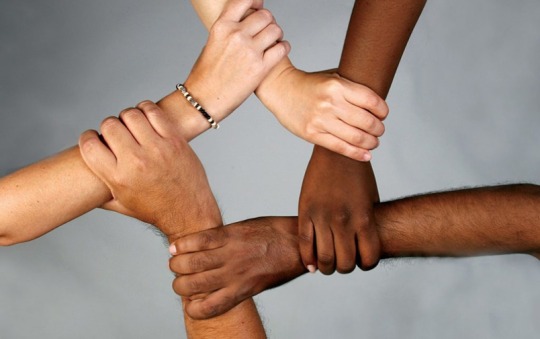
These names are only some of the various Black Americans who have been killed by using the police within the beyond decade alone. But it was Floyd's death that intensely woke America as much as police brutality and the horror of systemic racism that has seeped into America's underbelly because slavery started out inside the US four centuries ago.
The Black Lives Matter movement, which originated in July 2013 after George Zimmerman turned into acquitted for the killing of Trayvon Martin, is out in full pressure throughout the nation and worldwide.
But for a non-Black individual to fully apprehend anti-racism, they should endeavor to understand the underlying context of Reid's Tweet: Black lives (and voices) had been marginalized and silenced to the point of death for centuries. They've been trying to inform us about the deadly problem of institutionalized racism; the white community has not been taking note of them and has not been appearing to fix it.
Racism towards Black Americans isn't perpetuated amongst white Americans alone, and Black Americans are not the simplest racial group to be afflicted by racism. That is to say, racism and anti-racism exist in multitudes. But it was white European colonialists who were at the helm of slavery 400 years ago, laying the inspiration for today's structural racism that everyone is born into.
In learning and scripting this article, I became transported returned to my readings and research on colonization and racism from college African American literature classes. I realized with soreness that I shouldn't have stopped my education on the difficulty just because I no longer had a proper class — perhaps I faster could have understood how racism has embedded and benefited my day by day life. But I also realized that my white privilege isn't a burden to bear, but a manner for me to enact alternate.
The first step is getting to know what racism and anti-racism are, what it means to be anti-racist, and a way to take action. The guideline beneath is only a beginning point of understanding it all.
What is anti-racism?
"Anti-racism is an energetic and conscious attempt to work against multidimensional elements of racism," Georgetown African American studies professor Robert J. Patterson advised Business Insider.

Patterson, who wrote "Destructive Desires: Rhythm and Blues Culture and the Politics of Racial Equality," brought that we want to collectively shift our taking into consideration racism as conscious, intentional, overt movements to unconscious, covert, and unintentional movements. He brought that whilst racism can manifest individually, it often occurs institutionally.
When abolitionist Anthony Benezet based America's first abolition society in 1775, it is able to have signaled the first recognised act of anti-racism in America. Anti-racism has its foundations in abolition and the post-liberation fight for structural trade as well as 20th-century civil-rights movements, Malini Ranganathan, a faculty team lead at the Anti-Racist Research & Policy Center at American University, told Anna North of Vox.
But it's difficult to trace the exact beginning of the term "anti-racism."
Merriam-Webster will tell you the first recognized use of "anti-racist" become in 1943 — the equal yr Marxist historian Herbert Aptheker dismantled the longstanding argument that African Americans typical slavery in his book "American Negro Slave Revolts."
Aptheker, who later became the literary executor for creator and civil-rights activist W.E.B. DuBois, eventually overturned the then extensively held idea that each one whites universally accepted racism in his book "Anti-Racism in US History: The First 2 hundred Years."
Today, anti-racism is perhaps maximum closely related to Ibram X. Kendi, the founding director of American University's anti-racist studies center (who is now moving to Boston University to open an anti-racist center there), who popularized the concept together with his 2019 book "How to be an Anti-Racist." In it, he wrote: "The only way to undo racism is to always discover and describe it — and then dismantle it."
What does it mean to be anti-racist?
You don't need to be free of racism to be an anti-racist, Ijeoma Oluo, creator of "So You Want to Talk About Race," once tweeted. "Anti-racism is the dedication to combat racism anyplace you locate it, which include in yourself. And it's the simplest way forward," she wrote.
Racism perspectives a racial institution as culturally or socially inferior. An anti-racist, in line with Kendi's book, is "one who is expressing the idea that racial groups are equals and none desires developing, and is helping coverage that reduces racial inequality."
But to recognize what an anti-racist is, one ought to additionally apprehend what an anti-racist is not: a non-racist. There is no such aspect as a non-racist, Kendi writes, as it indicates neutrality.
"One endorses both the idea of a racial hierarchy as a racist, or racial equality as an anti-racist," he says. "One both believes issues are rooted in organizations of human beings, as a racist, or locates the roots of troubles in strength and policies, as an anti-racist. One both permits racial inequities to persevere, as a racist, or confronts racial inequities, as an anti-racist."
Patterson, the Georgetown professor, stated that humans "collapse identification and behavior" when they misconstrue now not being racist as being anti-racist. In the process, they underappreciate how action alerts anti-racism and underestimate their very own influence in dismantling the structures that guide racism.
Patterson stated Kendi's view of anti-racism highlights the way racism is socialized into behaviors — how racial inequities and disparities are embedded in private and public life. We should unravel those behaviors via thinking about and pulling back assumptions we make approximately "the naturalness of things," he stated.
If your default wondering is "I'm not racist," a greater knowledgeable point of view would be spotting how you're informed and influenced by way of the embeddedness of race and institutionalized racism.
"It's in reality critically thinking about and studying how race subjects in seemingly nonracial context," he stated.
To be an anti-racist, Kendi said in an interview with Vox, is to admit while we're being racist and then challenging those racist ideas.
"We adopt anti-racist thoughts that say the problem is strength and coverage whilst there's inequity, now not humans." That is, it's far the gadget, not a racial group, that wishes to be changed. "And then we spend our time, we spend our funds, we spend our strength hard racist policy and electricity."
What is the difference between an ally and an anti-racist?
"I assume that human beings suppose that racism is Black human beings's trouble," Patterson said.
It isn't always. Misunderstanding whose trouble racism is and who can fix it misplaces the weight of obligation to solving racism directly to the disadvantaged group.
"Racism is a white hassle," Robin DiAngelo, sociologist and the white anti-racist creator of "White Fragility," informed The Guardian in a February 2019 interview. "It turned into built and created via white humans and the remaining obligation lies with white people. For too lengthy we've checked out it as though it were a person else's trouble, as though it turned into created in a vacuum."
That leaves the onus on white people for non-public ACCOUNTABILITY : Understanding and spotting the financial and social advantages and privileges this machine bestowed upon them (which include this writer) and taking action to transform these conditions.
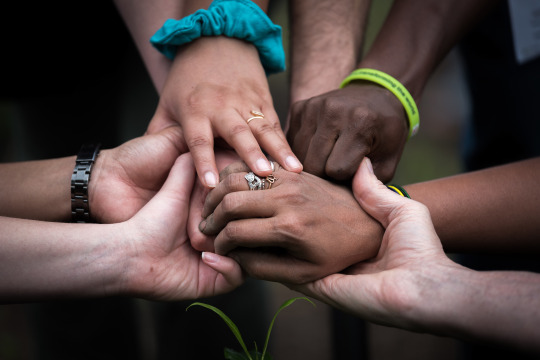
This involves getting beyond white disgrace and guilt. While white people today didn't create racism, activist Ben O'Keefe tells Vox, they can choose to confess that they gain from it and acknowledge their power in converting conditions.
"We don't want you to hold the load of your privilege," he said, addressing the white community. "We want you renowned it and to use your privilege, sell good, and to fight oppression."
But in the usage of white privilege for distinctive vantage points to speak approximately anti-racist practices, it's important to now not talk for Black humans's experiences, Patterson said. That "kind of reinforces the concept that Black people can't speak for themselves or that you need a white voice to authenticate what the Black attitude is," he said.
The act of doing additionally marks the difference between an ally and an anti-racist. An ally, Patterson stated, is someone who supports the cause and is interested in the issues, however doesn't as explicitly interact in actions. "An anti-racist is extra actively fighting towards the structures, et cetera, that perpetuate racism, while an ally might be in a extra supportive cast role," he added.
To be clear: It is movement that lies at the heart of anti-racism. As Kendi wrote in a December 2018 article for The Guardian, "A racist or anti-racist isn't always who we are, but what we're doing within the moment."
Keep in thoughts that anti-racism isn't approximately sitting on information, however acting on it.
Here's where you could start.
Educate yourself. Read approximately privilege, histories of race, and oppressed voices with the help of anti-racism reading lists from courses like The Strategist and Time.
Identify steps to take by talking to friends, family, and peers.
Check out this Google Doc of anti-racism resources.
Volunteer or donate to organizations combating racist rules that create and assist racial inequality.
Call out racism while you see it and espouse anti-racist ideas to help change racist policies.
Patterson said most of these exceptional steps will create an arsenal of demonstrative ongoing hobby that isn't just "for the hashtag." For example, remember how these movements could play out whilst you're in a board room discussing diversity and inclusion or in a college-admissions committee discussing test ratings and supposedly objective measures, Patterson said.
It took too long for non-Black human beings to capture directly to the Black Lives Matter movement. But now that the white network is listening, we all want to apprehend our strength in creating exchange. And Kendi stated it great in his interview with Boston University earlier this week: "You have to agree with alternate is possible on the way to convey it approximately."
2 notes
·
View notes
Text
You Are my Sunshine
Writer: @wingletblackbird
Prompt 20: Gale returns and he and Katniss patch things up. Peeta seems to feel he’s lost her to Gale even after they healed together. Katniss won’t stands for this, and explains that no matter what, they would have happened anyways. “I’d choose you; in a hundred lifetimes, in a hundred worlds, in any version of reality. I’d find you and choose you.” [submitted by @albinokittens300]
A/N: I wrote this up in about an hour; it is utterly unbetaed, and I hope you like it. I’m afraid I had to rush my last few EFE fics as life came in and ripped up my writing schedule with a series of Lab reports, finals, magnificent colds, and emergency hospital visits that wound up being nothing anyway. *sigh*
Rating: Eh, PG I guess.
Warnings: References to graphic sights involving children, and subsequent trauma.
You are my Sunshine
Peeta and I toasted in the summer. Some people thought it was too fast, others thought it was a long time coming. I didn’t really care what they thought. It needed to happen.
We didn’t get married legally. Maybe we will eventually, probably in fact, but it’s the Toasting that matters in Twelve. There were a hundred and one reasons you might never want to go to the Justice Building. Instead we had the Toasting; we never held with the Capitol’s rules. Of course, things are supposed to be different now, but the cameras all in our faces certainly haven’t changed. Not worth the risk. Neither Peeta nor I are ready to handle that.
There are a lot of things we really aren’t handling. It took me forever to get used to the idea that he’s really here. Peeta still struggles to sort Real from Not Real. I struggle to get up and face a world, live in a world, where toddlers are blown to bits by mines. (An arm here, a leg there, a baby finger crunched under someone’s boots.) A world where all goodness is killed, including my beloved sister.
But that’s not true, because there is Peeta. Peeta who came back to me. Who has always returned to me. Who reminds me that it wasn’t pointless, doesn’t have to be pointless, who rises from the ash, and paints the suffering with hope, and lays it as the foundation to build on, and paints the bleak grey with colour. I need him.
This is why I toasted with him. It was hard to believe he came back; when I looked at him I felt like I was gazing at the sun which would blind me, and then blind me worse when my eyes started to adjust and I was thrown into the blackness of the abyss. But he stayed. He stayed and he was here, and I knew now no amount of distance, or pretense, or excuses would prevent my heart from ripping out of me if I lost him. There was nothing to gain in hiding. It would only hurt him. Impossibly he needed me to, and I would never let him live again without knowing I was his. I needed him to be mine.
It’s not a conventional marriage by any means. The wedding night aside, sex is something we don’t have often yet. Not because we don’t want to, (we really, really want to), but because…kids. I can’t have kids, and even Peeta agrees now is not the time. We aren’t ready. Peeta still has violent episodes, second guesses himself, and I am fighting everyday, but I can’t count on enough victories to throw children into the mix. Birth control doesn’t always work, and worse still makes you more depressed. My moods are bad enough as it is. I don’t need anything to drag me down to where I was before. The medication I take already has side effects. I don’t feel up to adding anymore. And Peeta agrees. I had the most awkward conversation of my life with Momma who assured me there were natural ways that she and my father used to wait years after marriage before having me. It’s just as good as any stupid Capitol-grade drug. (It’ll be a long time before I trust anything from the Capitol.) But, just to be safe, Peeta and I have decided to wait a year before taking risks with our potential kid’s lives. I must love him a lot to ever agree to anything that would even hint at “potential”. But the idea doesn’t terrify me; just the idea of losing them that makes me so sick I once vomited. I’ll never forget the dream I had in the Quell, even if I’m not ready to face it yet.
So it’s no surprise how I reacted when the unexpected came knocking one crisp, fall afternoon. I don’t know what I was expecting, but it wasn’t to see Gale’s face when I opened the door.
“Agh!” I screamed and slammed it in his face, running upstairs to cry and shake in my bed.
All I saw when I looked at Gale was dead children, dead sister, toddler blood spewing out of ruptured arteries, dead eyes gaping out of pudgy heads.
Peeta finds me like that. I haltingly sputter words out as he holds me.
The next day Peeta calmly explains that Gale is here as a part of a Peacekeeping force to help rebuild, and protect Twelve from any possible retaliation by people who want the Games back. Three days later, he slowly convinces me to talk to Gale.
“I know you care about him, Katniss.” He points out. “We’ve already lost enough. Don’t you think?”
I huff and roll my eyes, knowing I’ll do exactly what he suggests. Why does he have to be so…Peeta?
It’s awkward. It’s hard not to look at him and see despair. He says he’s sorry about Prim, and I am nasty enough to point out it wasn’t only Prim who died, and throw out an “I told you so.” Hadn’t I told him that justifications like his would lead to the Hunger Games? Didn’t we almost have another one? Did the other kids not matter because they were from the Capitol? He who would have killed all of them? I am raging and seething and months and years of pain are pouring out in my words like a lanced boil. If words were physical I would be vomiting blood all over him, but I stop. I stop because I see the agony in his eyes, and a slump in his shoulders I have never seen before.
I have never seen Gale look humble.
And I remember Gale was supposed to be in District 2. District 2 had been slaughtered under his plan, and would have been worse without my interference, without Peeta’s admonishment which had always succeeded in inspiring. They must have hated him there. I hug him quickly and whisper sorry before heading home.
It takes time.
One month.
Two.
Gale is my hunting partner again. We work well in the woods. We always have, but now that it is not the only thing I can cling to that’s tangible, I see so clearly what I have known for ages. Gale and I would never work outside the woods. We feel the woods, and we like to rage at things together in them. We listen to the other vent, but I have no interest in his ambitions, nor he in mine. Gale and I are both fighters for reasons that don’t line up. We look the same to the uninitiated, with our bows and arrows in hand, but take a closer look and our colours are different. It’s nice to have each other’s back again.
It takes me weeks more to realise the gossip that surrounds us. I am so used to being talked about, I don’t notice the comments about “Everdeen and Hawthorne” until Haymitch laughs when I tell him I think Peeta’s been avoiding me. I am annoyed. I thought Peeta and I had made more progress then this.
“Boy’s gone home. His old one. Think something about seeing you and tall, dark, and surly walk by the bakery together brought up some uncomfortable memories, Sweetheart.”
I don’t even hear what the old drunk says afterwards as I run to the house Peeta was given when he became a Victor. He hasn’t been here since we married.
“Peeta!” I shout, but hear no answer. I run from room to room frantically. My heart racing in a terror that feels all too familiar. I should have been more careful. I should have been paying more attention. I should have… I should have… I war with myself not to think of bombs and cannons and things wrapping around my neck.
“Peeta!”
He shoots up, and reaches for his leg before he realises it’s me.
“Katniss?” He mumbles groggily. “What’re you doing here?”
“I couldn’t find you. Every time I’ve gone to the bakery, you’re not there, and you’ve seemed distant, so I finally got mad.”
“Sorry,” he says, and I ignore it, because sometimes with Peeta “sorry” is a reflex that means nothing.
“Did you have a flashback?”
“Kind of.” He says as he sits up, and seething though I am, I crawl into the bed next to him.
“You saw me walking home with Gale?” I prompt.
“Same as always. It was like the Games never happened. And I was just watching you walk right past me with him.”
“Peeta…”
“No,” he raises a hand to shush me. “I know without the Games, you might never have given me the time of day. You never wanted marriage or kids. And what would you have wanted with me when I finally worked up the nerve to talk to you?”
“Peeta….”
“And after the war, you couldn’t bear to look at Gale. And Prim lay between you, but now…” He shakes his head and shrugs his shoulders. “You don’t have to…I was the one who…Everything’s better now. You don’t have to stay with me if you don’t want. You don’t have to settle.”
“I’m not settling!”
“Katniss…”
“I’m not!”
“Peeta, listen to me.” I grab his hands and hold them in mine. “I’ve told you. It was never Gale. We’re friends; we’ve had each other’s backs, but he’s never made me want to get up in the morning just to see his face, and he’s never made me feel like however miserable it is, the world can be good only because he’s still in it. I need that. I’ve always needed that. And I’m not with you because you came back first, and I was grieving, or because we were Reaped together, because I knew who you were years before that, and I watched you, and worried for you, and hoped again. Stood up again. And… and..” I take a deep breath, “I’d choose you; in a hundred lifetimes, in a hundred worlds, in any version of reality, I’d find you and choose you.”
“Really?”
“Really.” When I can tell it’s sunk in, I add what I have to say, “And I’m deeply, deeply offended that you think I’d have married you, and been with you, and be able to walk away from you.” It’s true. I may be a master at avoidance, but once I commit, I commit. Period. End of story. I am just a little hurt, or I would be if I didn’t know the demons my boy wrestles with.
Peeta laughs, but I see exhaustion in his eyes, so I sidle up closer, and put a hand on his chest to make him lie down. Cradling him I tell to go to sleep and I’ll even sing him a song, a special one, just for him. I’ve never sung it to anyone else. It has a different name, but I call it Peeta’s song. Heaven knows I never understood it until I met him.
You are my sunshine my only sunshine
You make me happy when skies are grey
You’ll never know dear how much I love you
So please don’t take my sunshine away
119 notes
·
View notes
Text
13 Books on Money to Transform Your Finance Management
One of the most obvious measures of our success is our wealth. That said, that statement alone can be taken in various directions. Some people think it’s a matter of how much wealth you have. We, on the other hand, believe that it’s more of how much you’re able to retain and manage from month to month and year to year. Below is a list of books on money that we believe will transform your way of thinking about money management in several ways. From sparking interesting conversations about it to making plans for your financial future, this list covers many aspects of finance management.
To help you find the best books on money to reach your personal finance goals, we’ve done the research for you and have formed this list of criteria.
Relevant – Even though money has been around for a long time, the economy has changed a lot over the years. We want to ensure you the books recommended are offering relevant advice that would be ideal in any financial environment.
Offers a system – Financial advice is great, but it doesn’t always stick. Each book should overall provide tips and habits that will allow you to build a system to help you manage your money.
Sparks conversations – Reading about money is one thing, but these books should also encourage you to talk more about money with those around you to some extent. Even though we all have our own ways of managing money, discussing money can have merits in some circumstances.
Practical – While these books provide general financial advice, they should remain practical in that the advice should be obtainable for people to achieve. Most people don’t have the funds necessary to start a real estate business, but they can put away a few hundred dollars into a savings or investment account every month. Practical books will help you achieve your goals.
1. I Will Teach You to Be Rich
As the title of the book suggests, Business Plan Sample, this book delivers on a plan to be rich. The author, Ramit Sethi, has a background in personal finance and provides a detailed six-week plan for living out a “rich life.” This book on money covers a wide variety of aspects like using credit cards and maximizing rewards from them, opening a high-yield savings account, and automating accounts where you can save money with no effort from you at all. This book is filled with nothing but pure actions that are outlined and sectioned off in a good way.
2. The Automatic Millionaire
Another one of the great books on money that will help you build a system is The Automatic Millionaire. Written by David Bach, a financial writer, this book focuses on our ability to automate our finances and builds a system based on that. The idea with this book is to give you the knowledge and information to put together a system in an afternoon that will make a large impact on your financial future for the better.
3. The Simple Path to Wealth
The principles from this book on money were first presented by the author to his daughter through a series of letters. As such, you’d expect there to be plenty of actionable advice when it comes to investing and overall saving. Considering the direction of the book further, this book is light and has a casual tone to it. That said, it won’t shy away from complicated explanations. It’s one of the highest-rated personal finance books around and it’s clear why it is.
4. Retire Before Mom and Dad
This is a book for those who are looking to be involved in the FIRE movement. FIRE stands for Financially Independent, Retire Early, and it’s clear why many people are striving for this or considering it. This book delves into the principles and acts as a primer for this movement and going down this path. That said, it also considers other principles that make FIRE more attainable or easier to achieve, even if you’re not planning on retirement in the next few years.
5. When She Makes More
Money is a topic that most people shy away from, and it makes sense. Money is a status thing and seeing someone making more can cause unease or resentment. Money can also strain relationships and overall cause harm. People fear talking about money and it’s those emotions that cause problems in the first place. This book on money is powerful as it provides opportunities for women to be talking to their partner about money. After all, stereotypically speaking, men are meant to be making more money than women and it’s a sore spot when it’s the reverse. This book is fantastic because the author, Farnoosh Torabi, lives a life where she is the one making more than her partner. Getting into details, this book looks at the realities and the various rules she’s set up with her partner. She also discusses ways to maximize earnings while minimizing conflict.
6. Women & Money
SuzeOrman is a financial advisor who most notably ran a show called The Suze Orman Show from 2002 to 2015. In the show, she received calls from viewers who asked for financial advice and whether or not it’s a good idea to buy various items. Orman has years of experience working in this field and pools a lot of her knowledge into the various books she’s published. Women & Money is one of the more recent ones. This book in particular talks about how women earn, invest, and save while also giving practical advice on retirement, marriage, and other topics. Whether you are 20 years old or 60, this is a good choice if you’re looking to learn more.
7. Think and Grow Rich
This famous book has been around for almost 90 years and still holds some relevant information. While this book on money won’t tell you about 401Ks and building a portfolio, Business Proposal, it takes a turn to the mindset of building wealth. Through this book, you’ll learn more about desire and persistence as opposed to strategy or money management. While this is an odd book on our list, we believe it’s still important as the stories and the lessons are still relevant to your money attitude today.
8. You Are a Badass at Making Money
As you can guess from this title, this book takes a lighthearted angle to personal finance. Similar to “Think and Grow Rich,” this book also focuses on the mindset of earning and keeping money. While this book lacks any sort of actionable financial advice, it’s compensated by the fact it’s inspiring. It’s an ideal book if you’re looking for a new perspective to making money and could spark conversation with friends, family, or your partner. On top of that, it’s a nice motivational booster.
9. The Millionaire Next Door
Another inspirational focused book that you’ll want to pick up is “The Millionaire Next Door.” Many years ago, Thomas J Stanley, Ph.D. and William D. Danko, Ph.D. did extensive research into the millionaires of America. From the various interviews they’ve conducted, they created a profile of America’s wealthiest citizens and discovered common connections amongst them all. Stanley wrote it all in this book that has garnered over 1,700 five-star reviews and provides tremendous insight into what it’s like to be a millionaire. This is all explained through seven habits that all of these individuals have in common. Again, there’s not so much practical advice here, but it prompts you to take a closer look at their overall lives and what you can do to change yours to be like theirs. Even if you’re not planning to be a millionaire, the lessons in there are all practical such as living below your means and rejecting traditional consumerism.
10. Spend Well, Live Rich
For those looking for a good book for budgeting and personal finance for beginners, this is a good pick. Author Michelle Singletary reflects on her life with her grandmother who raised five children on a modest salary. By watching her grandmother, Singletary devised principles that her grandmother used to support that kind of lifestyle with what money she had. Through those principles, you can find inspiration in her story while learning about how to stretch the money that you already have.
11. Your Money or Your Life
The core of this book is financial independence and lays out a plan to reach that goal. While this book is the longest in this list, it does provide advice on pretty much every aspect of financial independence you can think of. Free Invoice Online It covers things like mindset requirements as well as investment moves that you should be making. Even if your plan isn’t to retire early, there is plenty of advice in this book you can use.
12. Broke Millennial
Amongst millennials, this book on money is a favorite for its simple and relatable language. It touches on a lot of the struggles and issues that millennials are faced off with today—things like living with your parents in your 20s, dealing with student debt, and even dealing with friendships and your finances. Between all of this, the book does offer plenty of practical advice and things to consider for those within this age group. It covers a broad overview of checking your credit score to even buying your first home. Even if you’re not there, chances are likely that the information mentioned in this book will be relevant for quite some time.
13. Get a Financial Life
Another millennial-focused book is “Get a Financial Life,” which covers a lot of the basics for personal finance. This book is more direct with its advice since it covers things like doing your own taxes and paying off debt. The goal of this book is to provide a foundation for you to establish a financial life and it does so in a good and clear manner.
Final Thoughts
What a lot of these books teach us about money is that success doesn’t come overnight. It’s something that takes a while to build up. But it also shows just how changing your way of thinking or taking a few small steps can mean changing your financial path for the better. There are many great books on money, and these are only the start.
About StaylI
StaylI.com is the premier source of Business Plan Sample, Business documents , Business Proposal and Online Invoicing, Tools and Resources for Entrepreneurs. Think, Build, Succeed.
0 notes
Text
Email Marketing For Authors
New Post has been published on https://autotraffixpro.app/allenmendezsr/email-marketing-for-authors/
Email Marketing For Authors

Buy Now




Budding author or first-time novelist?
…And Lay The Foundation For Your Thriving Career As An Author
“You should write a book about it,” Priya said.
A specialist medical doctor and first-time author, she wasn’t sure how to sell more books.
She isn’t alone.
Most writers find it hardest to sell their debut novel or book.
I remember how I went about it in 1998.
First, I looked for people who were already selling ebooks to their audience. Allan was one of them. Based in Australia, he had a global following. His email list numbered over 25,000. I was on it. And had bought some products on his recommendation.
So I sent him a note. In it, I offered to let him promote my book to his followers – and even keep a generous 50% of the profit.
“He’ll be sure to jump on such a great deal,” I told myself… until his reply hit my inbox.
He turned me down flat!
Looking back, it was the best thing that ever happened to me. Because miffed and upset at this rejection, I decided to learn how to sell my book.
With a vengeance, I went to work. Signed up for newsletters. Registered on forums. Downloaded courses and guides.
And then, I spent hours and hours learning.
Running tests. Making mistakes. And fixing them.
Two months later, I made my first sale.
$4.95
It seemed like a fortune!
Even as I write this, I’m smiling – because at the time, I didn’t know this was the foundation of a structure that would help me sell 65+ ebooks I’ve written since then, to tens of thousands of readers all over the world, earning money that would help fund my passion-fueled project…
To sponsor life-saving heart surgery for my little patients from under-privileged families.
A journey that began in 1998 has saved the lives of 152 kids – and earned me a readership of nearly 150,000 people.
The good news is that you can do this too.
The bad news is that it would take you 20 years.
Unless you are smart… and get started early with the most effective marketing technique to sell many books.
That’s exactly what I’m ready to teach you in a powerful little ebook called
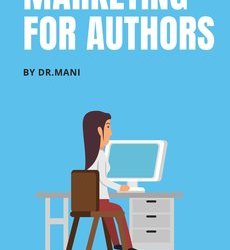
This short, actionable guide is free of any fluff and filler. You get right to the meat.
You’ll learn what to do – and what to avoid.
You’ll hear about proven principles and effective tactics.
You’ll see exactly what to say in your emails and when to send out your messages.
You’ll know where to find your subscribers and how to add them to your list.
You’ll discover secrets that help you sell more books to a hungry crowd that simply can’t wait to buy from you.
I won’t assume you know anything about email marketing. In fact, I’ll take it that while you’re good at writing, you only know how to send personal email messages.
We’ll start from there – and by the time you’re done reading “Email Marketing For Authors”, you’ll know EVERYTHING about using email to sell more books!
You’ll learn:
What is email marketing – and how you can use it to sell books, ebooks and even other stuff.
Why email marketing is the most important thing an author can do – next to writing a book! Hint: Ignore it and you’ll leave money on the table.
5 power principles of email marketing for authors – that will make you stand out and get noticed even in a crowded, noisy inbox!
What to say in your first email that will speed you along the magical 3-step ‘Know-Like-Trust’ path to more book sales.
The best free gifts to suck new subscribers onto your email list – like a powerful magnet attracts iron.
How to choose the right email service provider – not the cheapest one! Don’t get blasted into oblivion just because you tried to save a few bucks.
3 Easy ways to sidestep dangerous pitfalls that will leave your email campaign dead in the water – or buried in a spam folder.
How to add more readers to your email list – and what to tell them so they get more and more excited about buying your book.
You’ll also discover:
Where to find your ideal prospects – and the 8 top ways to sign up fresh crowds of passionate readers to introduce to your books.
A breakthrough system to launch your book to bestseller status – by driving a flurry of sales that rocket your title to the top of charts!
Why branding and consistency matter – and the 7 questions to ask yourself that will guarantee you’ll outsell your competition for years and years to come.
Easy tools to help you get set up quickly – and add website or blog visitors to your email database instantly.
Which email laws must be strictly obeyed – and how any good email marketing service will get your back.
How often to email your list – and why you shouldn’t wait longer than a month to stay in touch if you want to sell more books.
What, when and how to monitor progress – so that you can quickly correct course and get your book marketing back on track.
What to do next, once your basics are in place – so you’ll build on the momentum and carry it through until your next book is ready… and then the next!
But wait! There’s more…
I’ve included a 10-message email sequence that actually worked in the real world to make my ebook a ‘Top 100 Best Seller’ on Amazon.com – just with effective email marketing!
You get copies of the exact messages that went out to my email list – along with my comments and analysis to help you understand what about them makes the campaign work so well.
Once you know that, you can engineer them into your own email marketing – and sell more books!
So…
What’s this worth to you
?
A few hundred dollars? Certainly.
A few thousand? Maybe.
But what if I let you have it for under twenty bucks? Wouldn’t you call it a “steal”?
Well, it is indeed a steal… because you can download ‘Email Marketing For Authors’ today for
Just $19.95
ORDER NOW – Click Here

At this price, I thought to break out the 10-email best-seller sequence and offer it as a separate product – for $97, or more. But for the moment, I’m leaving it in the same ebook… so you’ll get it at no extra cost.
That could change at any time.
So if you come back later and find that it’s no longer a part of the ebook, you’ll only have yourself to blame!
Grab ‘Email Marketing For Authors’ right now – for $19.95
(And get the $97.00 Bestseller Email Sequence for free!)
BUY NOW – Click Here
Still not sure?
Want a ‘guarantee’?
Okay, here you go…
If you order ‘Email Marketing For Authors’, read it, and find that it doesn’t reveal all that I’ve promised, or get you started on the journey to use email marketing to sell more books, then simply ask for your money back. I’ll courteously issue you a refund – no questions asked – for the next 60 days.
There, you no longer have an excuse to wait.
Go ahead and order your copy now: click here
You can thank me later when you have an email list with thousands of fans, and a string of bestseller launches in the near future!
All success,
Dr.Mani
P.S. – If you’re an author and want to sell more books, you need to master email marketing. This guide will get you started – and keep you going.
Download ‘Email Marketing For Authors’ now – for just $19.95 : click here

0 notes
Text
Bael, Rose(s) of Winterfell, and Prophecies
So this meta is written in response to @bloomray and laney’s conversation that you all should read here before reading what follows. It’ll make more sense that way since this adds on a few things to B’s post.
Preface of Sorts
So first, a quick confession. I’m real hard pressed to find any evidence in ASOIAF of Jonerys. I’m sure it exists; I’m sure shippers can point me to something somewhere, but everything mostly feels like a stretch. And hey, that’s okay because god knows you don’t have to ship stuff that’s even remotely canonical. To each their own and all that. What does annoy me, however, is leveraging certain lines and selectively reading without a lot of context in order to prove canonical foundation. For me, the line that gets stretched the most is this one from the House of the Undying prophecies:
A blue flower grew from a chink in a wall of ice, and filled the air with sweetness.
Somehow, blue flower = Jon and sweetness = romance, and hence Jonerys is endgame. As bloomray pointed out in her post (and as other meta writers have as well), sweetness has a lot of negative connotations to it in ASOIAF, particularly in Dany’s narrative. Bloomray already outlined that in her piece, so I’m not going to rehash that here other than to say that perhaps the sweet smell could be the sweet smell of decaying flesh from the Others and Wights Beyond-the-Wall that Jon’s narrative is tied to? Just a thought.
Anyway, what I’m most interested in is the blue flower part in this post. Laney came up with the initial idea of the blue flower alluding to the tale of Bael the Bard, and bloomray expanded upon it in her post.
For this post, I want to talk about framing and the context surrounding the places where we hear about the tale of Bael the Bard to understand how it might fit into Jon’s narrative and, by extension, what GRRM is trying to get at in the HotU prophecy.
Bael the Bard’s Song
First, let’s talk about where Bael appears most significantly in the text. The only places that Bael isn’t just name-dropped in passing are Jon VI in ACOK and Jon I in ASOS. The former is where the story is laid out, and the latter is when it is revealed that Mance infiltrated Bobby B’s visit to Winterfell. It may be worth noting, in passing, that Bael is never mentioned in ASOIAF outside of Jon’s POV. Thus, I think it’s fair to say that the story of Bael is meant to tell us something about Jon.
So the story itself:
“North or south, singers always find a ready welcome, so Bael ate at Lord Stark’s own table, and played for the lord in his high seat until half the night was gone. The old songs he played, the new ones he’d made himself, and he played and sang so well that when he was done, the lord offered to let him name his own reward. ‘All I ask is a flower,’ Bael answered, ‘the fairest flower that blooms in the gardens o’ Winterfell.’”
“Now as it happened the winter roses had only then come into bloom, and no flower is so rare nor precious. So the Stark sent to his glass gardens and commanded that the most beautiful o’ the winter roses be plucked for the singer’s payment. And so it was done. But when morning come, the singer had vanished...and so had Lord Brandon’s maiden daughter. Her bed they found empty, but for the pale blue rose that Bael had left on the pillow where her head had lain.”
[...]
“Lord Brandon had no other children. At his behest, the black crows flew forth from their castles in the hundreds, but nowhere could they find any sign o’ Bael or this maid. For most a year they searched, till the lord lost heart and took to his bed, and it seemed as though the line o’ Starks was at its end. But one night as he lay waiting to die, Lord Brandon heard a child’s cry. He followed the sound and found his daughter back in her bedchamber, asleep with a babe at her breast.”
“Bael had brought her back?”
“No, They had been in Winterfell all the time, hiding with the dead beneath the castle. The maid loved Bael so dearly she bore him a son, the song says...though if truth be told, all the maids love Bael in them songs he wrote. Be that as it may, what’s certain is that Bael left the child in payment for the rose be’d plucked unasked, and that the boy grew to be the next Lord Stark. So there it is--you have Bael’s blood in you, same as me.”
-Jon VI, ACOK
Alright, so there’s that--the tale itself. And the similarities to Rhaegar and Lyanna are definitely there within the story itself. Singer, Winterfell’s daughter, a son born to a dying line (Targs), etc.
Perhaps Jonerys shippers read the similarities between the tale and Rhaegar/Lyanna and make the blue rose a connection to Targaryen bedding Stark. I say bedding here because (1) I don’t believe Rhaegar/Lyanna were ever married, (2) the power dynamics make consent very challenging in this relationship, and (3) as Ygritte says, maybe the Rose of Winterfell did love Bael like the song claims, but in Bael’s songs everyone is in love with him so it’s hard to say what the nature of the relationship was.
Winter’s Rose v2.0 - Lyanna Stark; Or, Why This isn’t About Jonerys, but Jon’s Parentage
Now that we have access to the tale itself, I want to talk about what surrounds the tale. As I said in my preface, I think what frames the tale tells us a lot about how we’re supposed to read it both in the context of the chapter and ASOIAF as a whole.
Let’s look at what comes almost directly before the tale first. Ygritte and Jon share the following exchange:
“You said you were the Bastard o’ Winterfell.”
“I am.”
“Who was your mother?”
“Some woman. Most of them are.” Someone had said that to him once. He did not remember who.
She smiled again, a flash of white teeth. “And she never sung you the song o’ the winter rose?”
“I never knew my mother. Or any such song.”
“Bael the Bard made it,” said Ygritte. - Jon VI, ACOK
And then what follows shortly after when Jon is tasked with beheading Ygritte:
He raised Longclaw over his head, both hands tight around the grip. One cut, with all my weight behind it. He could give her a quick clean death, at least. He was his father’s son. Wasn’t he? Wasn’t he? - Jon VI, ACOK
The tale of Bael the Bard is bookended with mentions of Jon’s (1) maternity, and (2) paternity. Naturally, when Jon references being his father’s son, he’s talking about the man who passes the sentence swinging the sword. But it takes on such a beautiful, double meaning for the reader in the midst of mentioning his mother, telling the tale of Winterfell’s daughter (the Winter Rose) being abducted by a singer, and then Jon questioning his paternity.
The blue rose is meant to represent Lyanna. Of course it’s tied up in the great Rhaegar/Lyanna debacle, but it’s first and foremost about the Rose of Winterfell. Jon is associated with the blue rose through his mother. Yes, through the crown of roses Rhaegar bestowed upon her, but even more significantly through this legend---Winterfell’s daughter and her bastard son who return to Winterfell while he’s still a babe at her breast.
We know Jon will be important in the War for the Dawn, just as Dany will be. It’s only natural they meet. They are, after all, the last surviving big-name Targaryens. But to see that her seeing him in a vision means that they’re going to have a romance or bang? Well, need bloomray and I remind you that Dany also saw a man with a wolf’s head being paraded around (Robb Stark). No one is pairing Dany with a resurrected Robb Stark. We can’t assume anyone she sees in the vision is meant to be her lover.
Into Every Generation? Winter’s Rose v3.0 - Or, I’m Shipper Trash Always and Forever
GRRM loves his sets of three, almost as much as I love Jonrya. The parallels between Lyanna and Arya have been written about a thousand times over. We’re meant to see those two as freakishly similar, from looks to personality. It’s in canon. I don’t think I need to rehash any of that here.
Likewise, bloomray already addressed a bit of the Jonrya parallels to the Bael story in her post. To briefly reiterate, on Jon’s behalf, Mance as Abel (read: Bael) goes to Winterfell in an attempt to save fArya and bring her home to Jon. Jon is the legend’s Bael by proxy, and Arya Winterfell’s daughter who Jon intends to spirit away from Winterfell. (Note: the 3.0 legend plays out by proxy on both ends, because Mance is Jon and Jeyne is Arya, but whatever).
Now, surely you’re thinking that I’m reaching here. Look, at little, yes, but let’s look at the framing of Bael in Jon I in ASOS. Jon goes to meet Mance, and it’s revealed that Mance was present during the King’s visit way back in AGOT. Then:
“Bael the Bard,” said Jon, remembering the tale that Ygritte had told him in the Frostfangs, the night he’d almost killed her.
“Would that I were. I will not deny that Bael’s exploit inspired mine own...but I did not steal either of your sisters that I recall. - Jon I, ASOS
So here Mance likens both Sansa and Arya to the Rose of Winterfell from the initial tale. We’re invited to read all Stark daughters as the Rose of Winterfell. GRRM through Mance is putting Sansa and Arya in the same position as he put Lyanna. If anyone is the Rose of Winterfell/Lyanna Stark in the blue rose image and backstory, it’s Sansa and Arya.
But there’s more. We see the tale appear in two important moments where Jon begins his decent into “breaking” his vows. Except he breaks his vows to play the long con on Mance & co. Sure, he bangs and falls for Ygritte (who reminds him of his little sister, which, weird), but he never truly things to break with the Night’s Watch.
Except he does in ADWD for Arya, Winter’s Rose and Daughter of Winterfell. He tries to steal her from Winterfell, to take part in a war with the Boltons, and thus really and truly breaks the vow that he’s been able to (TWICE befre) resist breaking about taking no part in the affairs of the realm.
But, you say, either Sansa or Arya could be the Winter Rose. Yeah, maybe, except let’s look back at the original story:
“Now as it happened the winter roses had only then come into bloom, and no flower is so rare nor precious.”
Sansa flowered in AGOT. Who is expected to bloom and become a woman in TWOW? Arya Stark. Just check out “Mercy” if you need any proof that she’s using her body sexually as a weapon. And who is the most precious to Jon? His heart, the girl he broke his vows for, the girl he gave his dick to in AGOT. ARYA F-ING STARK.
Conclusion
The beautiful parallels are there, my dears. Maybe v3 is too much to ask of you, and that’s totally okay. It makes a lot of sense to me, especially since ASOIAF up to this point has been basically an ode to Jonrya. Their love is about canonical as it gets. Platonic? Meh, if you must, but you have a lot of weird sexual thoughts to explain away if you think that’s just brother-sister stuff.
I would invite you, however, based on the context surrounding the tale of Bael and in light of everything @bloomray said her post, view that prophecy in the HotU not as Jonerys as canon, but as a not-so-subtle nod to Jon’s parentage for the reader to put the pieces together.
108 notes
·
View notes
Text
New story in Politics from Time: President Trump’s Mar-a-Lago Club Is Partially Reopening This Weekend
(FORT LAUDERDALE, Fla.) — President Donald Trump’s Mar-a-Lago club will partially reopen to members this weekend as South Florida slowly reopens from the coronavirus lockdown.
An email sent Thursday to members says the Palm Beach resort’s Beach Club restaurant, its pool and its whirlpool will reopen Saturday after being closed two months, but its main building that includes hotel rooms, the main dining area and the president’s private residence will remain closed. Members will have to practice social distancing and lounge chairs will be set 6 feet (2 meters) apart. They will have to bring their own towels.
The email was first reported by The Washington Post. The Trump Organization did not return a call seeking comment and a security guard who answered at Mar-a-Lago on Thursday afternoon said no administrators were available.
Florida Gov. Ron DeSantis, a close ally of the president, has been slowly allowing the state to reopen, with the hard-hit counties of South Florida trailing the rest of the state. Restaurants in Palm Beach County, like most of the state, can operate at 25% capacity indoors and must maintain 6 feet (2 meters) between tables outdoors. DeSantis is expected to soon boost the capacity limit to 50%. Bars and nightclubs are closed.
Mar-a-Lago executives told Florida officials last month that it was temporarily laying off 153 workers because of the shutdown, a decision the president defended at the time.
“You can’t have many hundreds of employees standing around doing nothing,” he said April 21. “There’s no customer. You’re not allowed to have a customer.”
The federal government’s economic relief bill specifically bars Trump’s businesses, as well as those with ties to other top government officials and members of Congress and their immediate families, from receiving emergency loans and other benefits meant to help businesses retain workers during the pandemic.
Palm Beach County has had nearly 4,300 confirmed COVID-19 cases since early March and at least 263 deaths.
As of 2018, Mar-a-Lago’s approximately 500 members paid $14,000 annual dues for access to the 17-acre (6.9-hectare) estate, with new members paying a $200,000 initiation fee that doubled after Trump’s 2016 election. Members pay extra to dine and stay on the property.
Trump purchased Mar-a-Lago — “the world’s most celebrated private club,” according to its website — from the foundation of cereal heiress Marjorie Merriweather Post in 1985 for $10 million and has invested tens of millions of dollars improving the property. He opened it as a club in 1995.
The property now boasts 58 bedrooms, 33 bathrooms, a 20,000-square-foot (1,858-square-meter) ballroom, tennis and croquet courts and three bomb shelters.
___
Associated Press writer Zeke Miller in Washington, D.C., contributed to this report.
By Terry Spencer / AP on May 15, 2020 at 12:16AM
0 notes
Text
How to Write the Beginning of Your Story
We all know the most important sentence in a story is the very first sentence. It has only one goal: to convince the reader to read the next sentence and then the next until they are fully immersed in your story.
The goal is simple, but executing the goal with success is a challenge we’ve all agonized over. It’s easy to obsess over the beginning and wonder if you’ve started in just the right place with the right scene or narration. Maybe it seems perfect to you, but beta readers tell you it’s not a good enough hook and you try to make it bigger and better, flashier and more action-packed.
Stop.
The opening of a story doesn’t have to be flashy or be a big, attention-grabbing action scene. A good opening holds readers interest because it does one thing very well: it establishes the narrative urgency of the story. It immediately lets your readers in on the most important thing they need to understand in order for this story to take place, feel real, and become true. The opening lays a foundation.
According to literary agent Donald Maass, an opening should accomplish these five things:
1. Establish narrative urgency
2. Evoke a sense of life or death
3. Set the mood or tone
4. Display your main character’s strengths and motivation
5. Ask the big story questions
All in the first few paragraphs or pages. That might sound like a tall order, but it’s amazing what you can pack in a few paragraphs once you pick up the skill. Let’s take a look at an example, the opening three paragraphs of John Green’s book
Turtles All the Way Down:
At the time I first realized I might be fictional, my weekdays were spent at a publicly funded institution on the north side of Indianapolis called White River High school, where I was required to eat lunch at a particular time--between 12:37 P.M. and 1:14 P.M.--by forces so much larger than myself that I couldn’t even begin to identify them. If those forces had given me a different lunch period, or if the tablemates who helped author my fate had chosen a different topic of conversation that September day, I would’ve met a different end--or at least a different middle. But I was beginning to learn that your life is a story told about you, not one that you tell.
Of course, you pretend to be the author. You have to. You think, I now choose to go to lunch, when that monotone beep rings from on high at 12:37. But really, the bell decides. You think you’re the painter, but you’re the canvas.
Hundreds of voices were shouting over one another in the cafeteria, so that the conversation became mere sound, the rushing of a river over rocks. And as I sat beneath fluorescent cylinders spewing aggressively artificial light, I thought about how we all believed ourselves to be the hero of some personal epic, when in fact we were basically identical organisms colonizing a vast and windowless room that smelled of Lysol and lard.
Now let’s analyse it.
1. What’s the narrative urgency or the one thing the narrator needs you to know right from the beginning?
It’s that this character’s life is largely or even entirely out of her control. That’s how she feels about her world, and that’s the central theme of this book, the central thing she has to confront and deal with.
2. Does this opening evoke a sense of life or death?
It evokes a sense of life, right? This is what life is to this character, how she perceives it. She says, “I was beginning to learn that your life is a story told about you, not one that you tell.”
3. What is the tone or mood set in this opening?
Kinda bleak, angsty, maybe a bit unguided. A tone that carries through the book and helps tell the story.
4. What are this character’s strengths and motivation?
Her strength is that she’s perceptive and aware. She knows she’s the canvas, but she wants to be the painter. And that’s ultimately her motivation the entire story, to be able to take control of her life.
5. What big story questions are asked?
What is this “fate” she mentions? Does she become the hero of her own personal epic, or does she remain fictional?
The ultimate question is, do you want to keep reading and find out? If you love stories that question the nature of existence and are filled with plenty of angst, of course you do. Or maybe this kind of story isn’t for you, so you don’t. Fair enough. But the opening gave you the big, important details so you were able to determine this right away, and you wouldn’t have known any of this if the story had started right in with the action.
So forget about hooks or trying to grab your readers with a bang. Action and flash without substance are confusing and disorenting, the opposite of what you want to accomplish in your opening. The beginning should be an orientation to the important things your readers need to know and understand right up front. Write that as your opening.
But how exactly do you take all this and turn it into the fabulous opening paragraphs of your story? Here are a few tips:
1. Don’t write the opening of your story first.
Chances are, you won’t know the most important thing about your story until you’ve finished it. So start right in with the action and tell the damn story. After it’s written and you know its guiding principle, then go back and write the opening.
2. It doesn’t have to be long.
Don’t get preachy about it. Simply express what it is you actually need to express and then get on with the story. Most often, the narrative urgency of the story can be quickly captured. Sure, sometimes it may take a page or two, but if you find yourself droning on, stop and ask if you really need all that. Try to boil it down to the most important thing readers need to know in order to understand the big picture of the story you’re about to tell. It’s an orientation, not an encyclopedia.
3. The opening says a lot about the person telling the story,
hopefully your main character. Not all stories are written in the first person, but it still helps to write your opening from the voice and perspective of a main character rather than some disembodied voice or narrator. Keep it as personal as possible because that’s what readers respond to. They judge the perspectives of others against their own and react. This is good. It’s what engages people with a story, so use it to your advantage.
4. These are merely guiding principles
to help you write a better opening, but always remember that you can break any established “rule” of narrative or storytelling if you do it with confidence and authority. All of this is to best serve the story, and if the story is best served with out of the box thinking, do it.
Go back and take a look at the beginning of your story. Does the opening accomplish these five things? Or even a few of them? Take some time to analyse it and then experiment with rewriting it in such a way that better captures the narrative urgency of the story you’re ultimately telling.
I originally wrote this for DeviantArt here.
This is one of the most important things I learned at the Writer's Digest Annual Conference in New York City this summer. This knowledge is courtesy of a Donald Maass seminar on the emotional craft of fiction. I pieced all this together from the examples he gave during his talk, and I added the tips at the end from personal experience. Donald Maass is a wealth of information on writing good fiction, and he's published quite a few books on writing that I recommend checking out.
1 note
·
View note
Text
Basking in Firelight-Jamilton Sequel-Part Twenty Three
Masterpost
Part Twenty-Three: Crumbling Foundations
AN
*Angelica voice* God I hope you're satisfied!
Well, I finally delivered after all this time with that last chapter. It was probably terrible because I'm not much of a smut writer, but there you go!
Anyway! On with the story!
I'm so going to hell
I'M NOT DEAD!! 😋 Sorry this took so long to get to you, I'm at the wedding right now. I go home tomorrow so updates will be back on track! Also, chapters are back to the normal 1000+ish range, so if this feels shorter than normal, it's not. You're just spoiled from the last couple chapters of fluff and Ness.
----
Warnings below
----
"I've decided that Monticello needs some massive updating," Jefferson said, stalking in the living room from the kitchen.
"Missing your fancy gas stove?" Hamilton asked from the couch, turning a page of his book.
"Yes! As a matter of fact, the entire place needs to be remodeled," Jefferson announced. He pointed dramatically at a wall, "Starting with that wall right there. It needs to go. And the stairs! Complete do-over. And don't even get me started on the bedroom."
"Didn't you design this place yourself? Why are you complaining?"
"Yes, I did design this place myself. About a million different times. Do you know how many times I've torn it down and started over?"
"Well, you can't do that anymore."
"Why the fuck not?" Jefferson asked, crossing his arms. "It's my house."
Hamilton sighed and shut his book, "Maybe once, but that was two hundred years ago. Now it's a historical landmark. The only reason we've gotten away with staying here so far is because the government shut it down to use as a base, so there's no tourists or official people around right now. What're you going to do? March up and demand it be turned over to you because you're Thomas Jefferson and it's rightfully yours?"
"But I am Thomas Jefferson and it is rightfully mine."
Hamilton snorted, "Good luck convincing other people that. You'll probably just get thrown into a mental hospital."
"Well, why did it end up as a museum then? I left it to you."
"Yeah, and I died about nine years later."
"Who'd you leave it to?"
"Madison."
"Ah. Yep, that explains it," Jefferson sighed, collapsing on the couch next to Hamilton, laying his head in his lap. "But this is my home. This is where you and I became more. This is where all our memories are. I can't give that up."
"We could build an exact replica."
Jefferson thought for a moment. "No, it wouldn't be right. Mostly because I would redesign it."
"You want to redesign this one anyway."
"But the story is still there! It's the same foundation, the same hill, the same sunset, if we move, it'll be gone. This is where we truly found each other, what if we die and come back again and can't find each other because all this is gone?"
"Thomas, stop," Hamilton said sternly. "You can't just steal such an import historical location from the nation."
"What nation, Hamilton?" Jefferson asked. "What nation do you see? Every state in the Eastern States of America left the Union a long time ago. The government is just in disbelief and refusing to acknowledge it. We're basically in the nation of Virginia."
"You know, you have a point there," Hamilton said, gears turning in his head. "This is government land and there is no government anymore. So this is conquered land. Maybe you can claim it. It's far-fetched and probably never going to work, but we could give it a try."
"Or," Jefferson went on, "I'll let you cook and when you accidentally burn the house down, we can claim it was lost in the war, the land will lose its significance, I can buy the land, and then I can remodel. That sounds way easier."
"You're suggesting arson?"
Jefferson shrugged, "I'm owed something for coming back from the dead just to fix this stupid nation, why not make it my home?"
Hamilton sighed, opening his book again on top of Jefferson's face. "Whatever you want. But we're stashing everything in the library."
"Deal," Jefferson said from underneath Hamilton's book.
"Speaking of the government, why don't you think they've retaliated against us taking over their base?" Hamilton asked.
"Ah, I've got a theory about this. You see, their commander probably got a report saying that you and I broke out of a maximum-security prison by simply slaughtering every soldier in the place. Then he got one that said that we, plus a ragtag group of volunteers, stole a tank from the middle of enemy ranks, in the middle of a battle with seemingly very little effort. Then the next report rolled in about us decimating their army when they had the entire rebel force trapped. So the commander's sitting trying to figure out how to get rid of these two guys that keep blowing his plans apart by pulling off insane shit that should never even work when another report rolls in saying that we took a leave of absence. He sitting there celebrating when he gets told that after our immediate departure, we wiped out every soldier here at Monticello. So he's like okay, odd, what're they doing now? Living peacefully, with seemingly no intention of moving their asses anywhere anytime soon. So the Commander is like, fuck, don't touch them, leave them be and pray they don't fight anymore."
"Yeah....Or they think it was an actual rebel move made by a regiment of soldiers that are now holding the base, so they're amassing a force to attack. It's only been, what? Two days since we took the base?" Hamilton said.
"My version is more badass."
"Your version is ridiculous."
"You're ridiculous," Jefferson shot back. Hamilton lightly smacked Jefferson with his book in response.
Jefferson leaped from Hamilton's lap, spun around, planted a kiss on Hamilton's lips, and strode out the door with a purposeful stride. Curious, Hamilton shut his book with a snap and followed him out. Hamilton found him standing on the front lawn, staring ahead, unmoving.
"What're you doing, mon chéri?" Hamilton asked, placing a hand on Jefferson's back.
"Where'd all these trees come from?" Jefferson asked.
"What do you mean?"
"Where are my fields? They were right there where the trees are. How did they get there so fast?"
"Thomas..."
Jefferson stared off for a moment, his eyes unfocusing. "Oh..." he stated simply after a moment. "Right. Sorry. No fields for farming anymore."
"Thomas, why don't you and I go lie down for a little while? Spend some time together. Relax," Hamilton proposed, worrying about Jefferson.
"No," Jefferson replied, "I think I'll take a walk. Clear my head."
"Do you want me to come with you?"
"No, it's fine. I'll be fine. I'd take a horse, but I don't have any anymore," he replied. "You go ahead and finish your book. I'll be back soon," he said as he walked off, following some path he seemed to remember from the old days.
Hamilton watched him go, wanting to go with him but knowing Jefferson wanted to be alone and the best thing to do was to respect that. So when he couldn't see Jefferson's back through the trees anymore, he walked back inside the house and continued reading his book as Jefferson suggested.
----
Warnings: ??
#jefferson x hamilton#hamilton#hamilton x jefferson#thomas jefferson x alexander hamilton#alexander hamilton#alexander hamilton x thomas jefferson#thomas jefferson x hamilton#thomas jefferson#hamilton x thomas jefferson#jamilton fanfiction#jamilton fanfic#jamilton#basking in firelight
5 notes
·
View notes
Text
Creating Your Own World
A lesson from your unqualified local fanfic writer. Aka me.
Now I’m definitely not a teacher, and some of the things I say might offend someone sensitive. Because tact and I are not friends, we never have been. We’re less friendly than me and math. Please keep this in mind while you’re reading.
For the lesson please see below. Keep in mind I am not a teacher; I’ve just been writing for literally over half my life now. And I know a thing or two about a thing or two.
So to start our lesson here are a few basic questions I want you to ask yourself every single time you go to create your own world. Whether you’re writing original works or fanfics always ask these questions. And just with answering these you’re on your way to a better constructed and well thought out creation.
1. Is it the same universe we are in now? Is it a brand new universe? Is it an alternate universe? Is it possibly just an alternate timeline? Is it an alternate reality?
2. What is different in this world from the original world? Or from reality? Or other worlds that already exist?
3. Did you base your differences on on a small detail or a large detail? Or were your differences based around a plot twist?
4. Did I make it clear that this is my own world and not the one I am branching away from? Including reality as we know it.
These are the basic questions you need to ask yourself every single time. Even if you know the answers to these immediately review them before you move on. These are the things that will not show on paper but are just as necessary to know about your world. Now I’ll touch each question in depth for a short while. Consider these questions step one in the many steps of creating a world of your own.
1 - Is it the same universe we are in now? Is it a brand new universe? Is it an alternate universe? Is it possibly just an alternate timeline? Is it an alternate reality?
This series of questions is important because you always need to know where you are starting from. Without a solid foundation your house, castle, or universe is going to crumble. And by that I mean self-implode because it sets up the very tone in which you’ll be starting your creation.
It’s easy for you to know if you’re setting up something new, one hundred percent your brain child and no one else’. However, it is important to know what you will be taking with you from this universe if anything. If not well then you are set for question two.
If you are not doing either of those then while asking yourself if it’s an alternate universe, timeline, or reality you will need to realize these three are very distinct while also very similar. If you’re well versed in the differences, which are subtle, it makes it easier on you later. Knowing which verse you are using will help you draw on the subtle nuances of that particular verse.
First we’ll go ahead and cover those differences.
We’ll start with alternate universe which is where everything is the same, yet so different. Such as evil selves, different occupations, same personalities different circumstances, etc. Now this is more of an umbrella really. However, there is a distinction between this and the other two. It does not cover everything. As usually in these the basic personality of the characters is either inverted to evil, a stereotype of whatever universe you are using, or they stay the same.
An alternate timeline is when one single event changed and the consequences of that event changing are in effect. Usually used as a plot device of what if, it is also sets up it’s own different and distinct order of events. And guess what that’s a new world all it’s own.
As to an alternate reality this is where alternate timeline and universe meet. Generally alternate realities are branches of a timeline caused by something. And the whole universe shifts around it.
Once you’ve decided which one you are working with you can begin to build. If you’re making your own universe you’ve set yourself up for building it. If you are working with a base world then you are set to start constructing on top of it. In the long run making the distinction will help you decide the course of action from there and how much you want to bend the characters if they are not yours.
If you are working with your own characters and the universe is the same, your own, or is an alternate universe, timeline, reality from whence they came you’ll need to keep in mind which one it is as well. It is always important to know what your base is.
These little details won’t be written down but they are an important decision you made on how you wanted your world to be constructed. And as everyone knows, especially authors, the little things are the things that matter.
2 - What is different in this world from the original world? Or from reality? Or other worlds that already exist?
This series of questions is important because after you’ve made the distinction of where you’re starting from you need to distinguish where you are. And by this I mean you need to figure out exactly what you’re planning on laying out on the table as a world different, unique, and yours.
There are several different ways to accomplish this, the ideas as vast as your imagination. However, for teaching purposes I’ll use an example of what I have done or have seen. I’ll continue to use this example and others throughout the many lessons so expect to see the same ones often.
The first example I will use is the very common colorblind soul mate alternate universe. As we just covered alternate universes you’ll know this falls into one because it is the same universe just trapped in a stereotype of soul mate format. Which is not that different from our own save the colorblindness.
Now for this example we will go with the most basic plot line with no details on why humans evolved such or the conditions of colorblindness. Those are creative touches that you can choose to add or not. Adding this background knowledge though is always encouraged as it adds more depth to your world. If you don’t want to add that in this alternate universe that is acceptable.
If and only if you draw enough distinction from the world you are making colorblind and the one in which we reside. Or any other worlds that also fall into this alternate universe stereotype. Unless you are using one as a base, which is fine. Though if you’re wanting to start afresh that's doable as well with the little details you add to make it yours.
A simple everyone is now colorblind until they find the other half of their soul suffices with this alternate universe. That’s quite a difference already from the world we live in if not from other such universes. This is not an uncommon stereotype alternate universe as such the burden of unique falls on you, the author. Adding in your creative flair with little details will make your world stand out. Or you can leave that task to the characters you have within it.
Knowing what the differences are between the worlds whether it’s the one you’re working from or the one we live in is important. It will help you later on to know the subtle and small differences. Even if it’s only something as small as blood types that play a part or something as obvious as colorblindness. Answering these questions sets you further on the path to your own world.
3 - Did you base your differences on on a small detail or a large detail? Or were your differences based around a plot twist?
The question series before invariably brings us to what you based your differences on. Which admittedly, just as everything in writing, is limited only by what you limit yourself to.
However, it is here we are going to talk about the application of the ideals above. You’ve at this point already found what kind of world you’re building and why it’s different. From there you need to figure out how you want that difference to show. In my previous example it was a pretty clear and clean cut difference. A very large part of the world was different and easily seen in the universe no matter how it is written.
Not all differences are that clear and easily displayed. If the difference is small, say a new and different blood type, that’s not easy. As you are then, in order to make a well developed world, in need of a way to show it. And the question of if this is considered a large, to be prominently displayed, difference or a small only you need to know difference. Or if this is a tie in to a plot twist you’re planning in the future.
With all world building there are going to be details only you know that may never show on paper. Is this one of them? If the detail is small the simple answer is yes. Until you have need to use the detail it is not something you need to write out other than to set up it’s existence. The rest is knowing that this detail of difference is still in effect.
That does not make the detail less important. If it is something that builds a deeper richer background it is needed. Even in just the way you write around the detail without ever saying it will show. There is depth in details especially the ones that helped you build the foundation. In example of this there could be a family tree that includes a crazy uncle that never gets mentioned but the character developed from it. Or something like the death of a species that could have been prevented that warped how the laws of the land are. Never directly stated but just as important in the application of the story.
Now for plot twists that’s another story as well. Since the whole time you were creating the world you were probably already thinking all of these details, just not putting them in order. Or you were and I don’t know why you’re reading this. Plot twists that involve the creation of your world aren’t quite as common so they can be tricky. Why? Because just like embedding the details of the world you also have to leave little clues that must go on the page for your plot twist to be pulled off.
We’ll use the example of blood types now. Say you’re writing about vampires they are only able to drink certain blood types. You’ve known this detail from stage one yet it hasn’t been in the story since then. Knowing this is a detail that sets your world apart but isn’t that important until the reveal of said blood type will help you write it in. It will allow you to look at the little things that must wrap around this detail until it’s reveal. Such as giving the vampires certain abilities that most vampires were previously unknown to have for obvious reasons of difference. Then wham they have purpose that’s totally not what your reader was thinking but when they look back the subtle things are there.
Now I’m going to make a few remarks here about what I’ve seen about unsuccessful plot twists. They did not have the forethought to embed little details before they got to that point. Or they were too obvious. While these are different topics they are something to think about when asking yourself this series of questions.
If you know what sets your world apart and it is embedded correctly you have set up your world successfully. And that will bring us to the final question. The last question you’ll need to ask yourself before you can truly call your world built.
4 - Did I make it clear that this is my own world and not the one I am branching away from? Including reality as we know it.
This question should be obvious. Whether you are using a base world or making your own from scratch as best you can. However, that isn’t always the case. Now this question can in some case be disregarded as can any of these questions if you know what you are setting up and have a solid idea of what you are making.
Though it is important to ask yourself this question because if you’re trying to make it your own you want your flair to show. All this question is wanting you to do is look back at what you’ve created and make sure it screams you. That everything is the way you wanted it. Once a foundation is set it is set and can not be rebuilt unless you pitch the whole thing and start over.
And unless you’re a fan of starting over I would suggest making sure that it speaks of you before you build upon it. This question is basically a reminder that the world is yours, make it yours. Show that it’s yours. Even in a fanfic the way you show yourself is in the way you present the world, characters included, to your reader.
That’s it. Answer these simple questions and you’re set to make it happen. And for the next lesson we’ll be diving into thinking about your reader.
1 note
·
View note